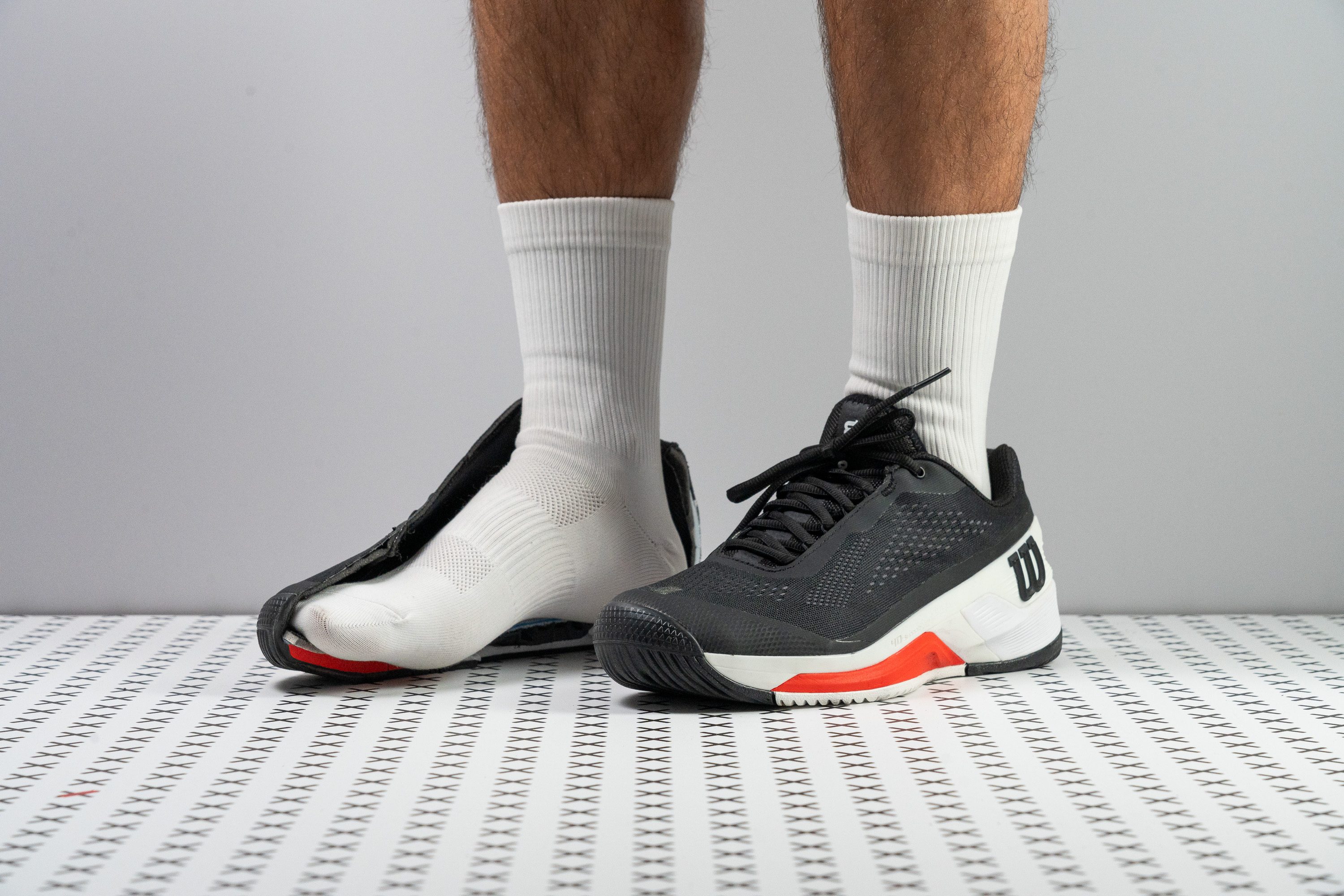Our verdict
Pros
- Amazingly soft cushioning
- Excellent impact protection
- High level of lateral stability
- Impressive upper and outsole durability
- Good grip-and-give balance
- Very flexible for a tennis shoe
- Accommodating fit
- Doesn't drag the foot down
Cons
- Awfully warm upper
- Outsole feels too grippy at first
- Webbed eyelets affect the lockdown
- Not for narrow feet
Audience verdict
Comparison
The most similar tennis shoes compared
+ + Add a shoe | |||||
|---|---|---|---|---|---|
| Audience score | 86 Great! | 89 Great! | 91 Superb! | 89 Great! | |
| Price | £140 | £140 | £135 | £135 | |
| Shoe type | All CourtHard Court | All CourtHard Court | All CourtHard Court | All CourtHard Court | |
| Shock absorption | - | Moderate | Low | High | |
| Energy return | - | High | Low | Low | |
| Traction | - | Moderate | Moderate | Moderate | |
| Construction | Stability | Speed | Stability | Speed | |
| Breathability | Warm | Moderate | Moderate | Breathable | |
| Weight lab | 12.9 oz / 367g | 11.7 oz / 332g | 13.9 oz / 393g | 10.9 oz / 309g | |
| Lightweight | ✗ | ✓ | ✗ | ✓ | |
| Drop lab | 9.1 mm | 10.7 mm | 10.9 mm | 9.8 mm | |
| Width / fit | Medium | Medium | Medium | Medium | |
| Toebox width | Medium | Medium | Narrow | Narrow | |
| Size | True to size | Slightly small | True to size | Slightly small | |
| Midsole softness | Balanced | Firm | Firm | Firm | |
| Stiffness | Stiff | Flexible | Moderate | Moderate | |
| Torsional rigidity | Moderate | Moderate | Stiff | Moderate | |
| Heel counter stiffness | Stiff | Stiff | Stiff | Stiff | |
| Midsole width - forefoot | Average | Very narrow | Average | Narrow | |
| Midsole width - heel | Average | Very narrow | Average | Average | |
| Outsole durability | Decent | Bad | Good | Good | |
| Heel padding durability | Bad | Good | Bad | Good | |
| Heel stack lab | 29.1 mm | 30.2 mm | 32.5 mm | 28.3 mm | |
| Forefoot | 20.0 mm | 19.5 mm | 21.6 mm | 18.5 mm | |
| Insole thickness | Thin | Average | Average | Average | |
| Removable insole | ✓ | ✓ | ✓ | ✓ | |
| Heel tab | None | Extended heel collar | None | Extended heel collar | |
| Toebox durability | Good | Good | Good | Good | |
| Outsole hardness | Average | Average | Average | Average | |
| Outsole thickness | Average | Very thin | Average | Thin | |
| Ranking | #17 Top 43% | #8 Top 20% | #3 Top 8% | #7 Top 18% | |
| Popularity | #39 Bottom 2% | #10 Top 25% | #1 Top 3% | #4 Top 10% |
Who should buy
We can confidently recommend the Wilson Rush Pro 4.0 to tennis players who want:
- a well-rounded shoe that is cushioned, stable, and not heavy
- a stable shoe that's not too firm or rigid
- a highly durable tennis shoe at a moderate price
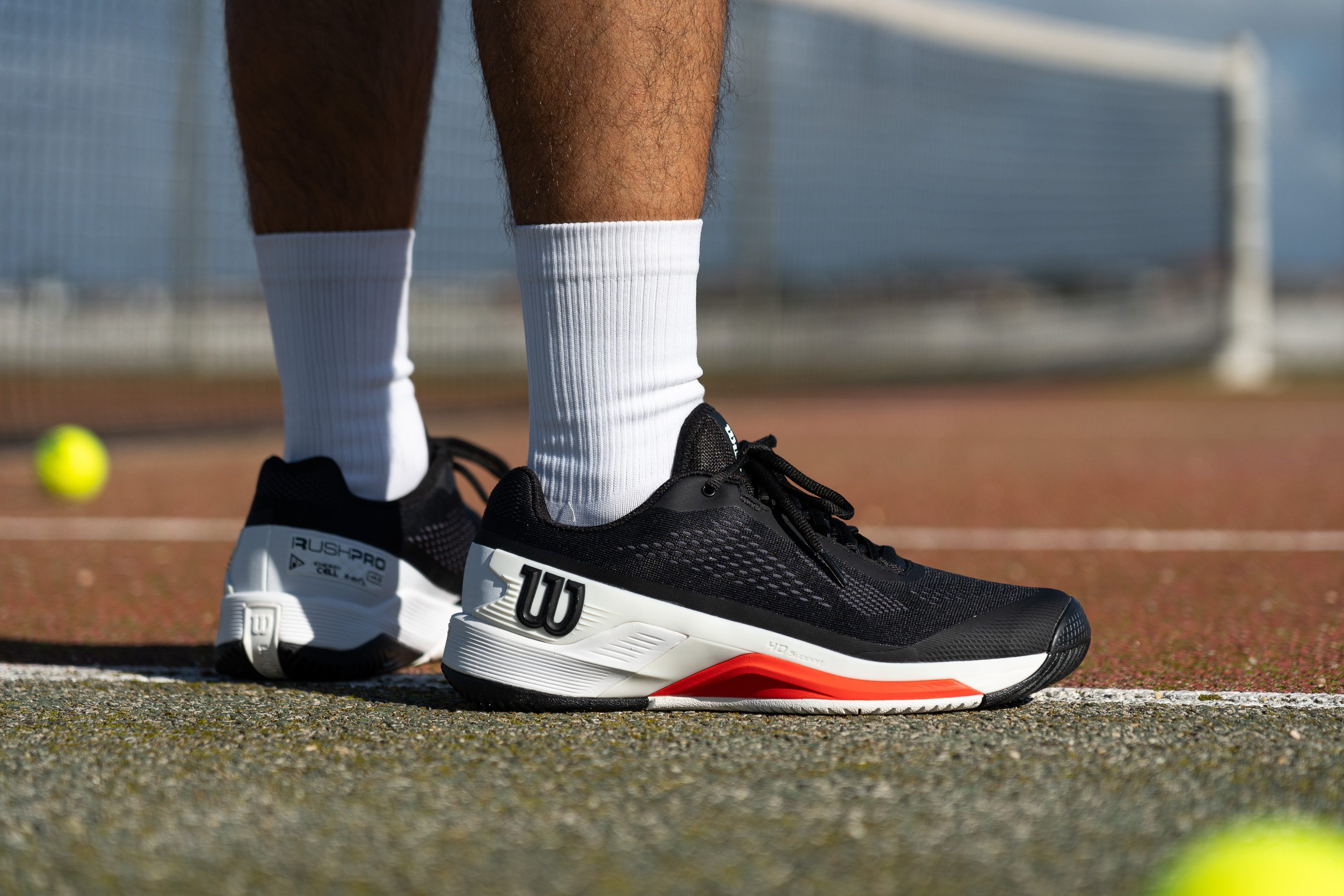
Who should NOT buy
The shoe's lack of breathability and webbed eyelets can be a deal-breaker for many tennis players.
As an alternative, we recommend looking into the K-Swiss Hypercourt Supreme. It is lighter, more breathable, and has a conventional (reliable!) lacing system with a great lockdown.
Another option is the Nike GP Challenge Pro which is heavier but has a more one-to-one fit and a wider, steadier platform.
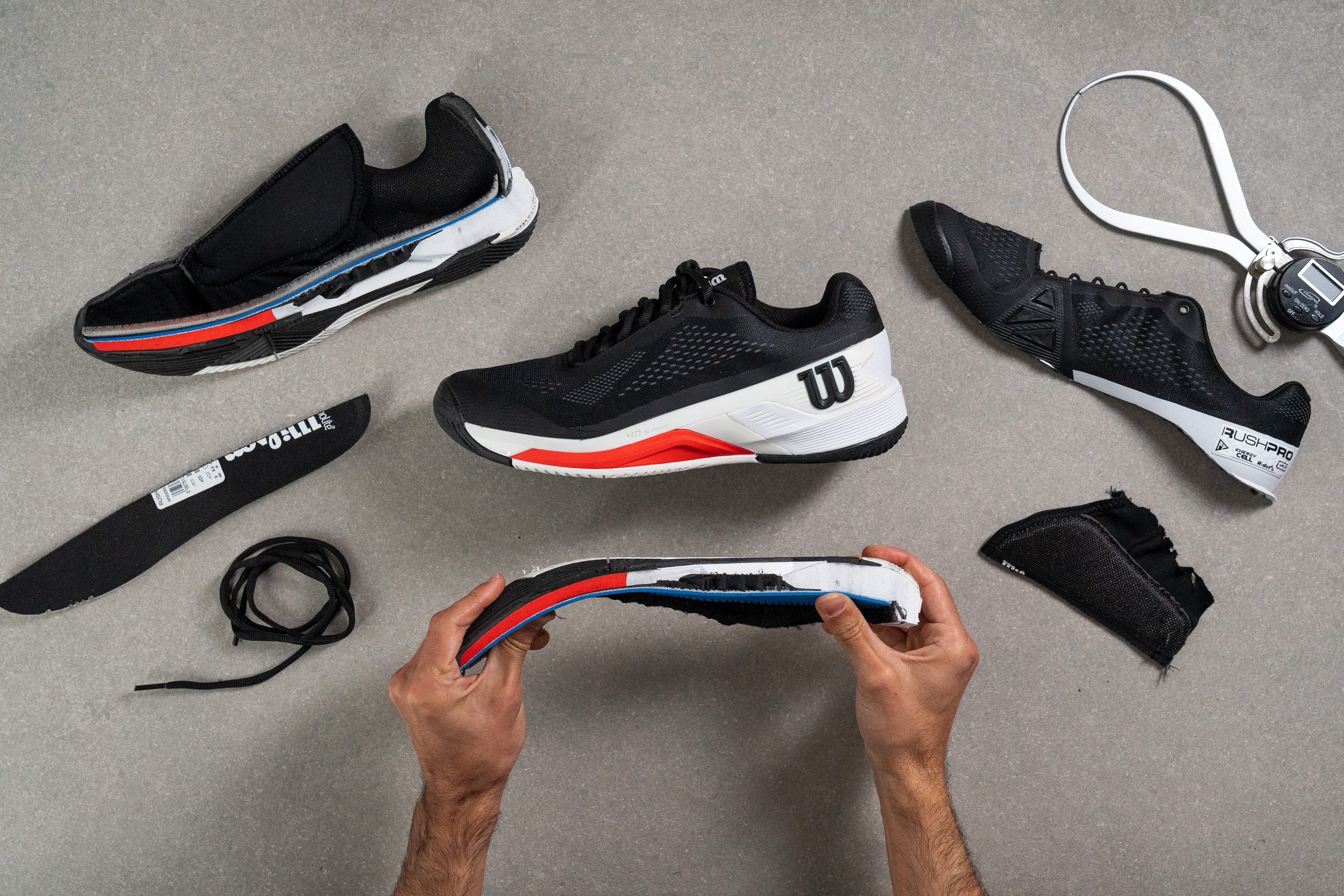
Cushioning
Heel stack
In terms of cushioning, the Rush Pro 4.0 feels very well-balanced. It is not too high off the court but not too grounded either. We have no complaints about the impact protection of this shoe.
Measuring its stack height in the heel, our calliper showed 29.1 mm. That's the average heel height across tennis shoes.
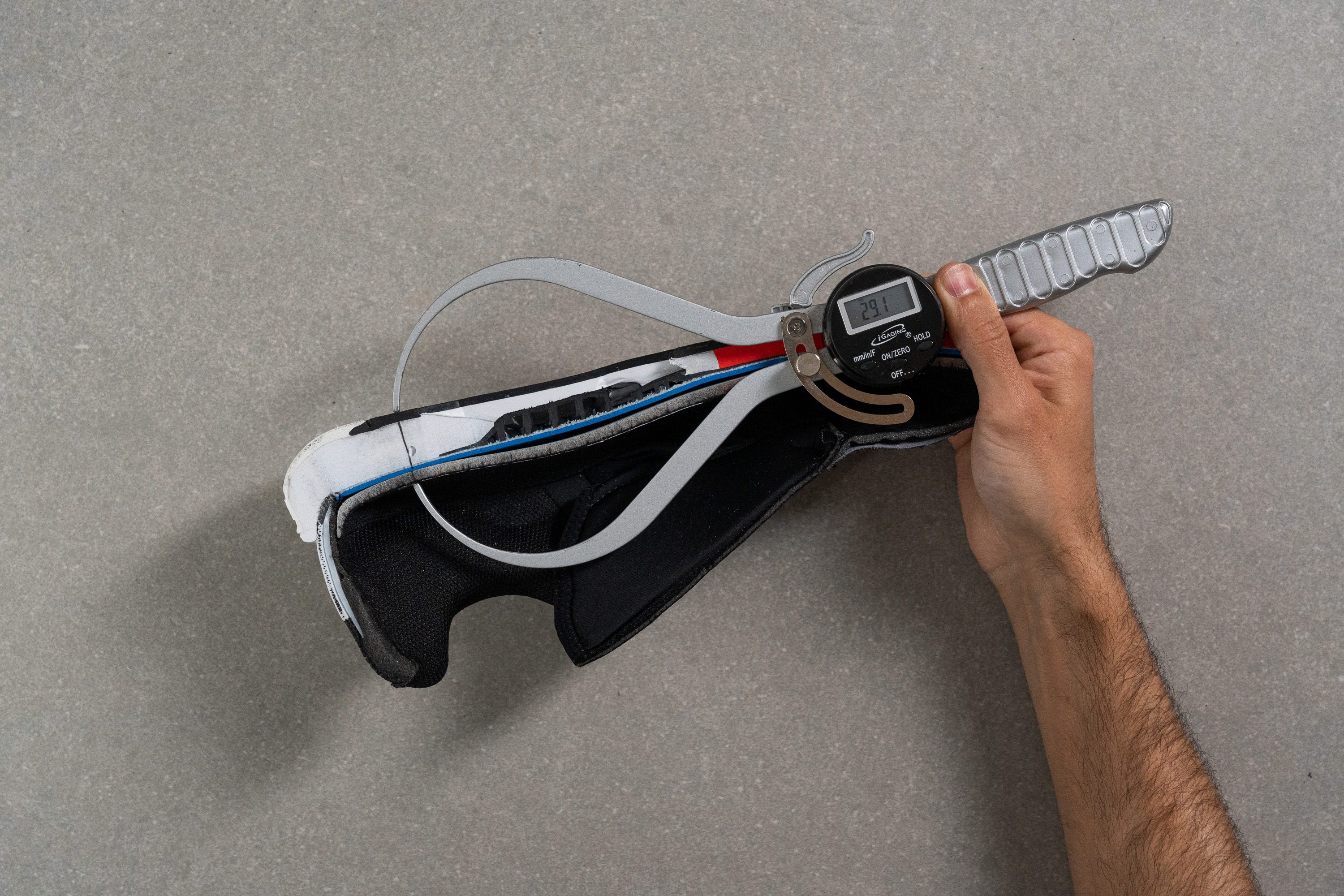
| Rush Pro 4.0 | 29.1 mm |
| Average | 29.3 mm |
Forefoot stack
In the shoe's forefoot, our calliper returned 20.0 mm which is also the same as the average.
We felt enough support under the balls of our feet for split steps, quick sprints to the net, and explosive takes-offs.
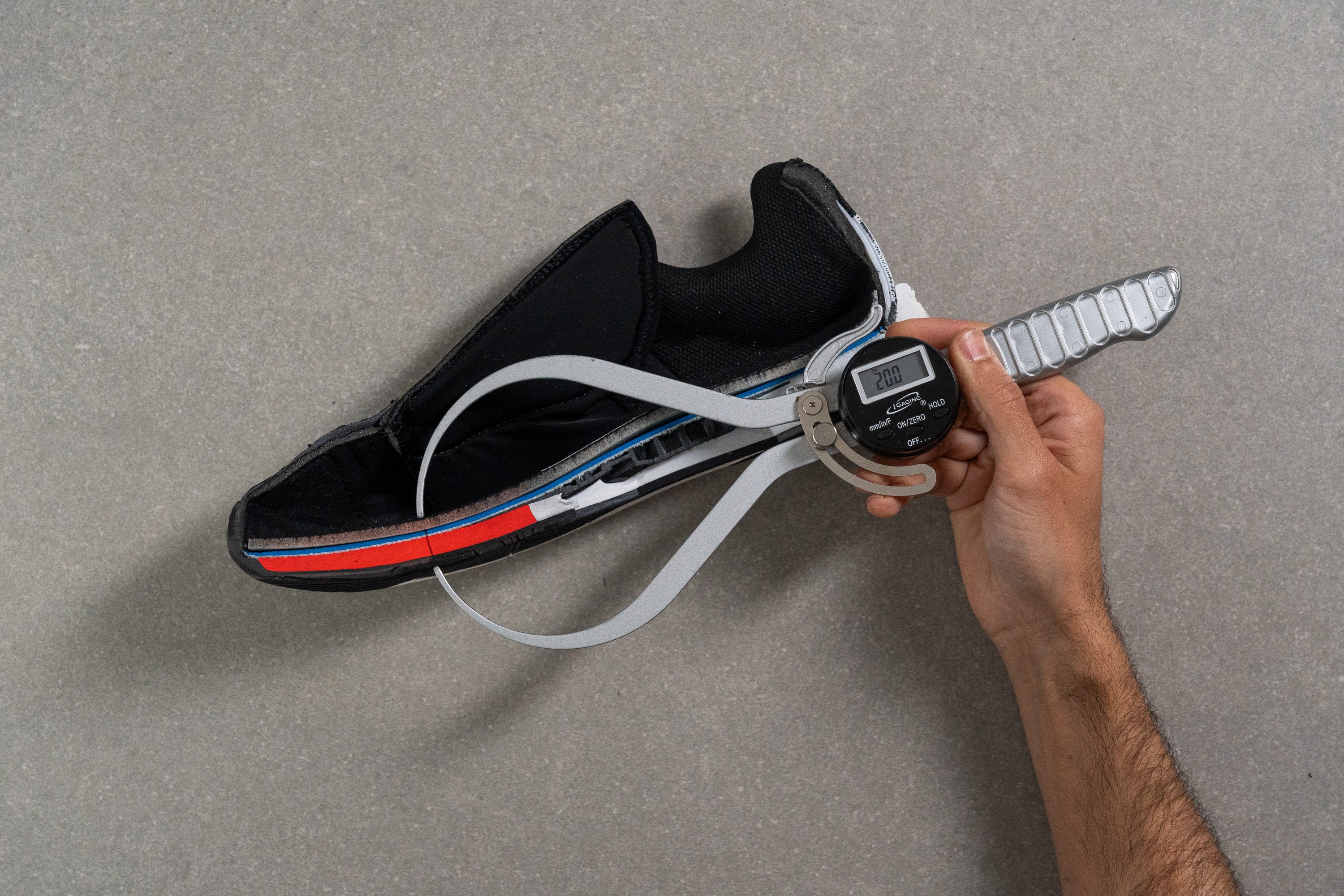
| Rush Pro 4.0 | 20.0 mm |
| Average | 19.5 mm |
Drop
We applaud Wilson's precision when it comes to the heel-to-toe drop!
In the official specs, the brand states that the Rush Pro 4.0 has a 9-mm drop. Our own measurements confirm this showing a 9.1-mm offset.
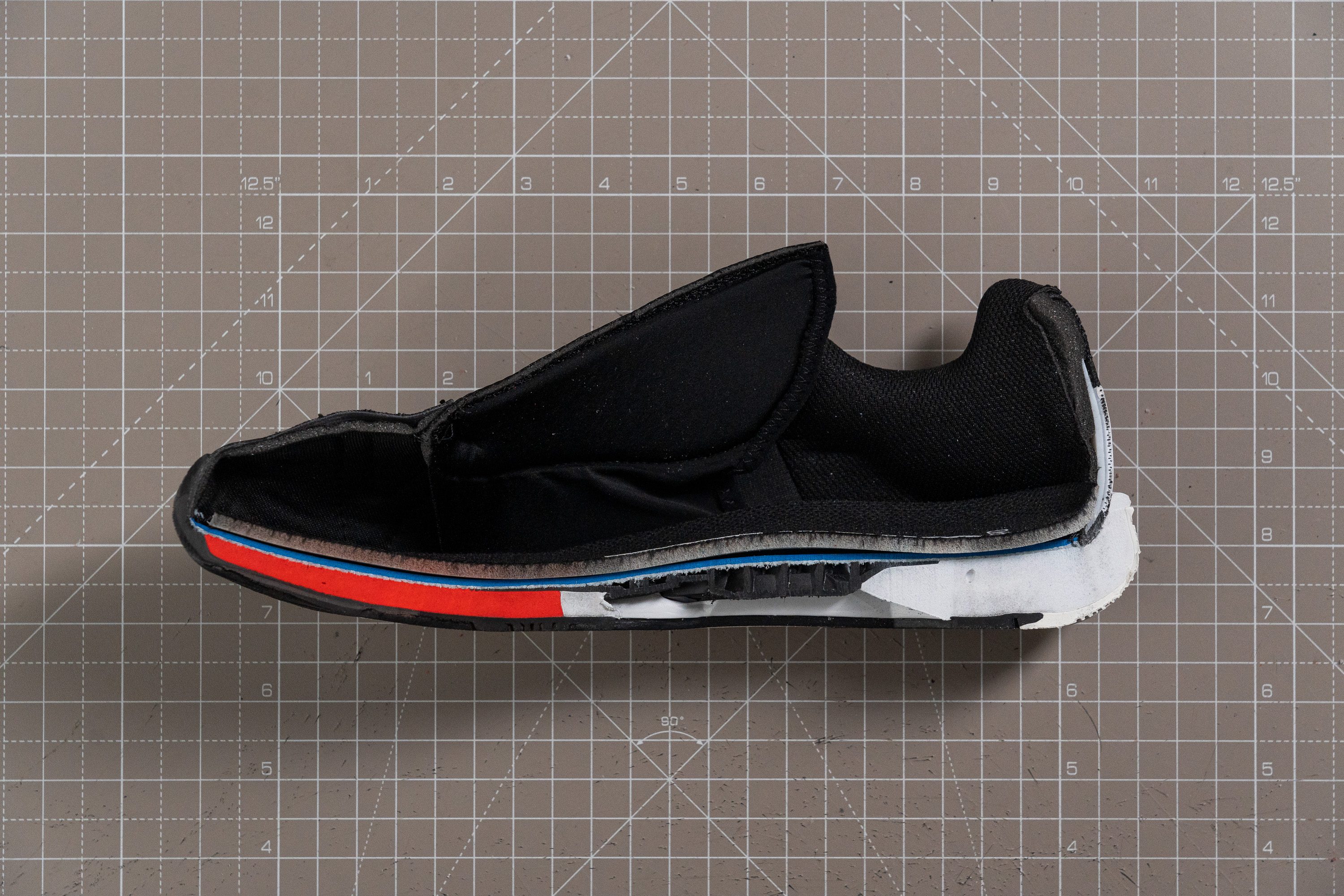
It also happens to be the average heel-to-toe difference across tennis shoes. This setup is most optimal with just enough heel elevation to provide comfort and take the pressure off the Achilles without compromising stability.
| Rush Pro 4.0 | 9.1 mm |
| Average | 9.8 mm |
Midsole softness
Stepping into the Wilson Rush Pro 4.0, we were amazed at the plushness that greeted our feet inside.
It is not common for tennis shoes to have soft cushioning these days. But Wilson found a way to mix it in without compromising the shoe's stability.
It is by far one of the softest tennis shoe midsoles we've tested in our lab!
Measuring the R-DST+ foam in the heel, our durometer returned 22.1 HA. That's a whopping 35% softer than average! We absolutely loved the shock absorption it provided on hard landings.
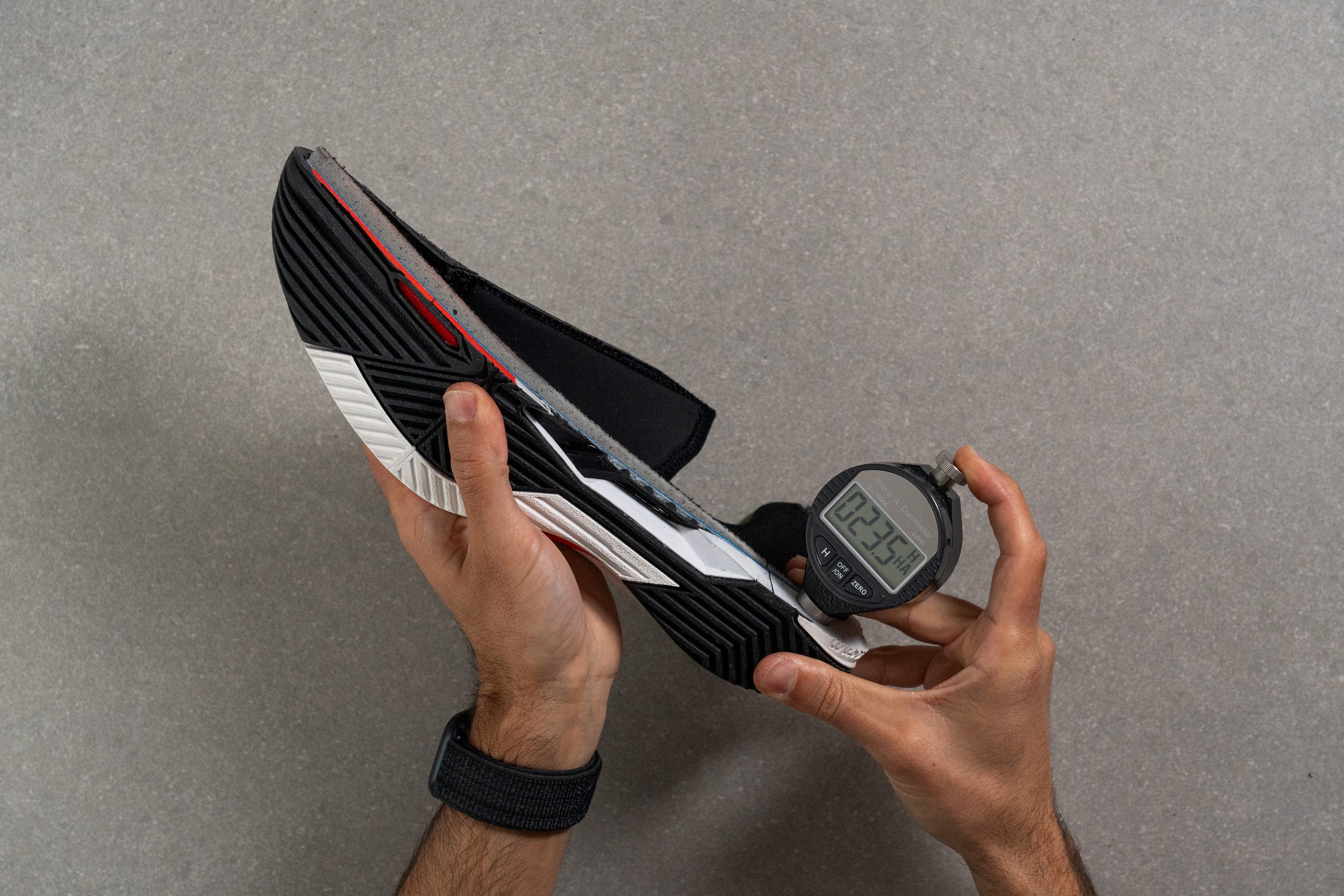
| Rush Pro 4.0 | 22.1 HA |
| Average | 28.0 HA |
Secondary foam softness
For the forefoot cushioning, the Wilson Rush Pro 4.0 uses a lighter and even softer EVA foam.
Pressing our durometer against it, we got 21.0 HA which is 5% softer than the heel cushioning. We thoroughly enjoyed the bounce it provided when we stayed on our toes or pushed off the balls of our feet with maximum force.
The only drawback of such soft foam is that it tends to bottom out faster compared to other cushioning foams.
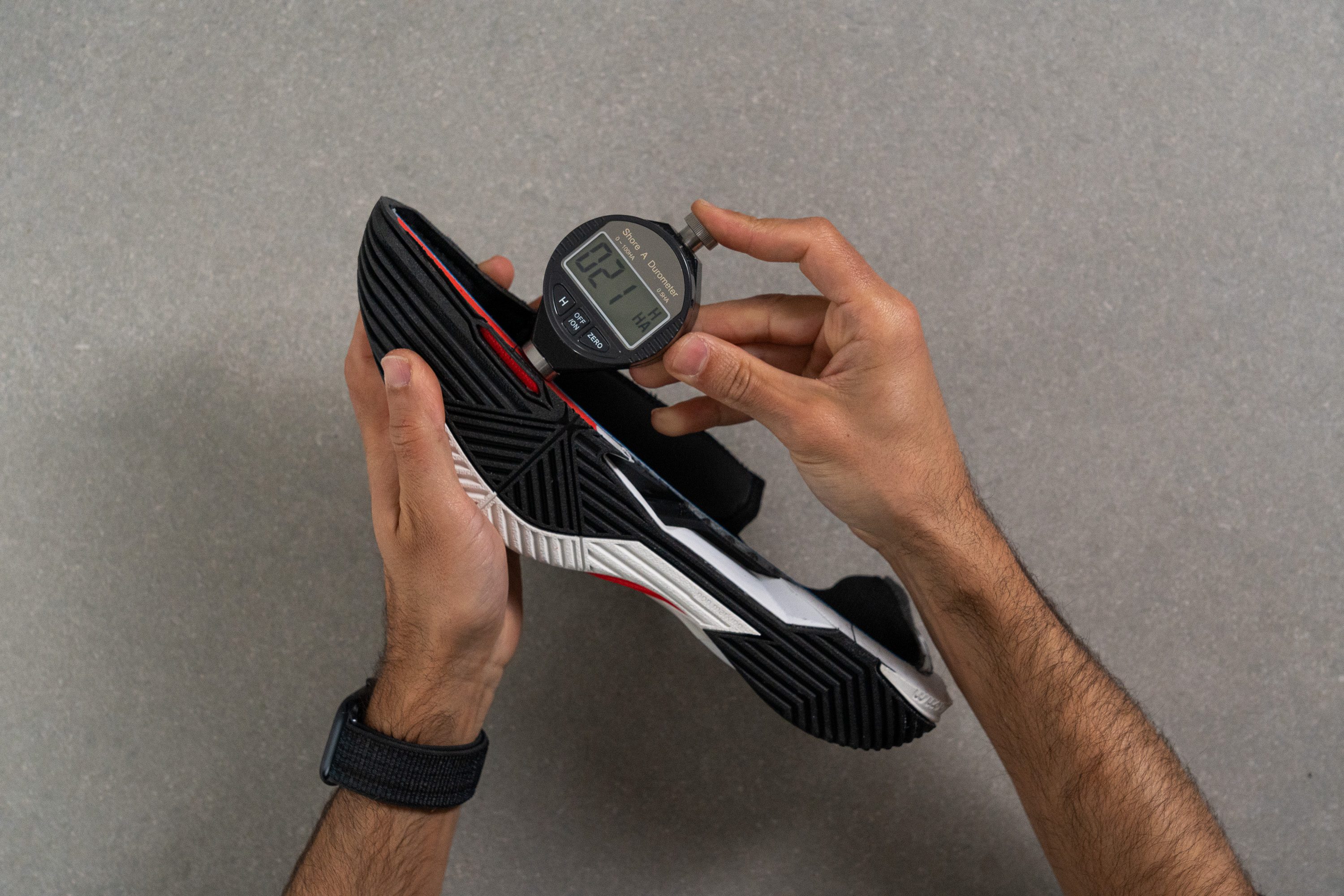
| Rush Pro 4.0 | 21.0 HA |
| Average | 25.7 HA |
Size and fit
Size
Wilson Rush Pro 4.0 fits true to size (17 votes).
Internal length
| Rush Pro 4.0 | 274.7 mm |
| Average | 271.0 mm |
Toebox width - widest part
The Wilson Rush Pro 4.0 treated us to an accommodating fit straight from the box. Unlike many tennis shoes we've tested, this one required zero breaking-in.

We found this surprising because our caliper measurements of the shoe's toebox weren't different from the average. In the widest part of the forefoot, the tool showed 101.9 mm which is standard for a tennis shoe in a men's US 9.
Perhaps this is because the Rush Pro 4.0 doesn't have the same thick and sturdy upper overlays as other tennis shoes do.
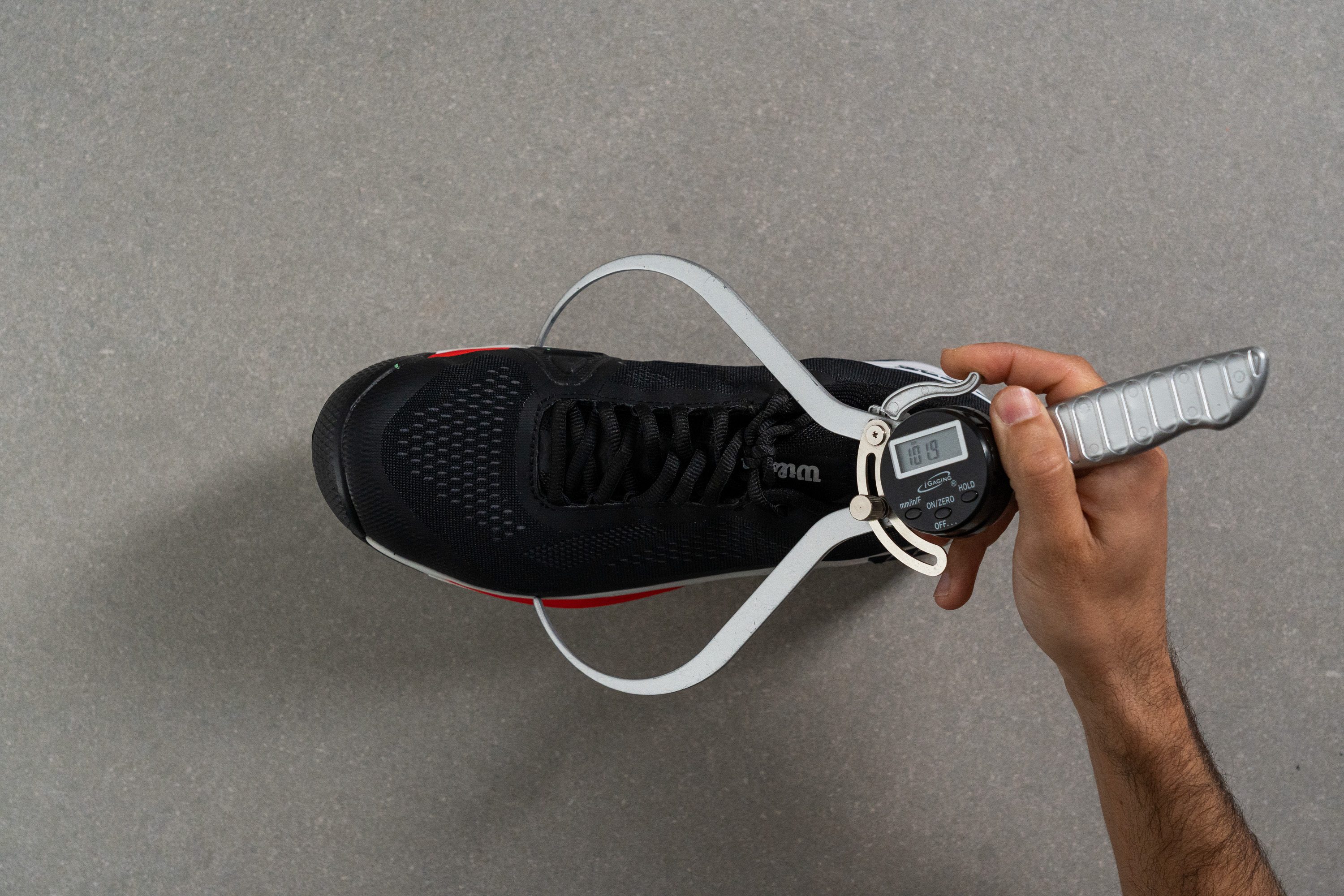
This test follows an older methodology, which is why you don't see recently tested shoes in the chart. Results from different methodologies can not be compared.
| Rush Pro 4.0 | 101.9 mm |
| Average | 101.0 mm |
Toebox width - big toe
This Wilson shoe also has a standard amount of space near the tip of the toebox. Measuring it where the big toe ends, our caliper showed 76.8 mm.
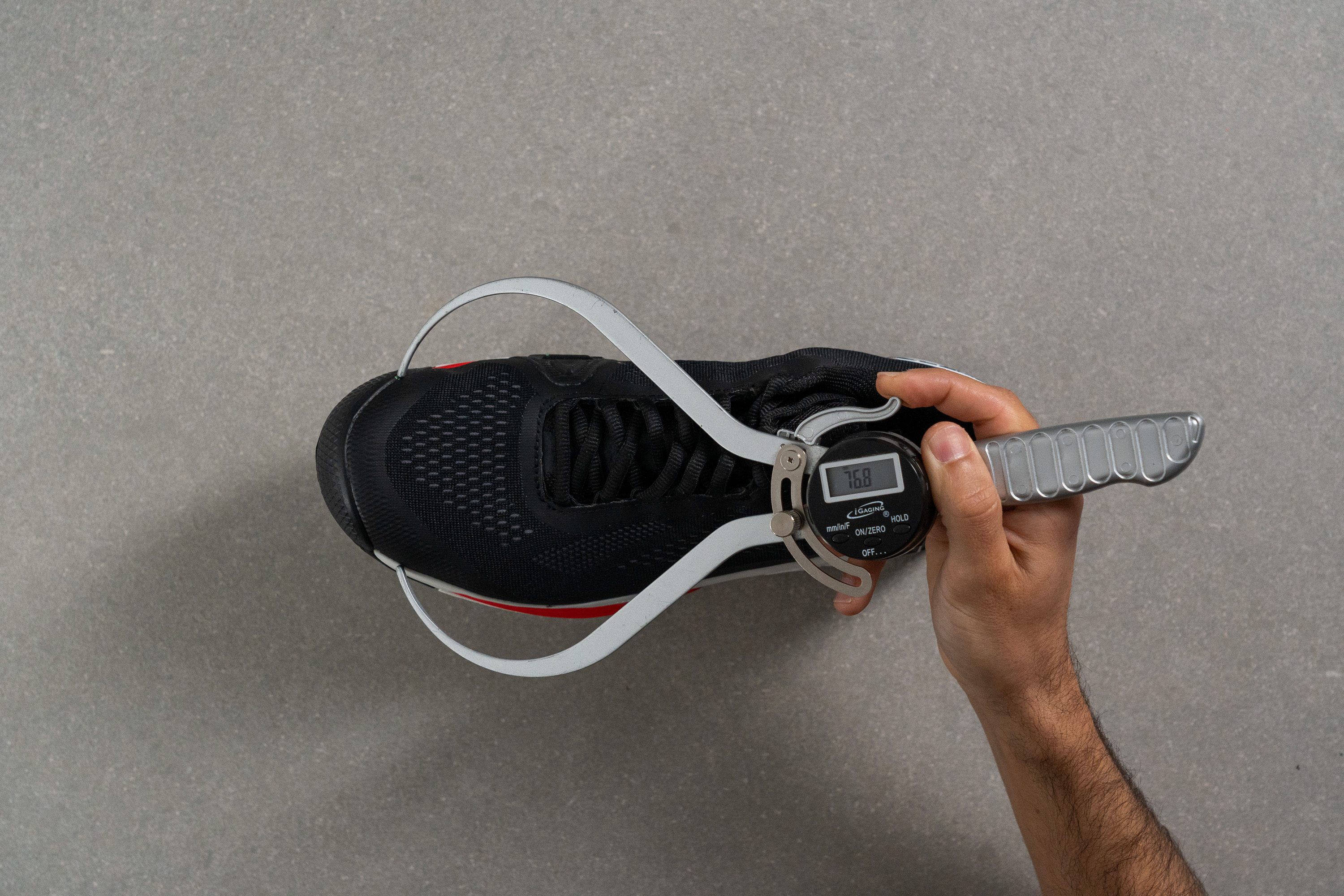
This test follows an older methodology, which is why you don't see recently tested shoes in the chart. Results from different methodologies can not be compared.
| Rush Pro 4.0 | 76.8 mm |
| Average | 76.9 mm |
Lockdown
We firmly believe that Wilson should've gone for the standard eyelet system in the Rush Pro 4.0.
Not only are these thin webbed eyelets more prone to tearing, but they also mess with the shoe's fit. We can see how people with narrower feet (or those who prefer a very tight fit in their tennis shoes) would want to crank down the laces a lot in this model.
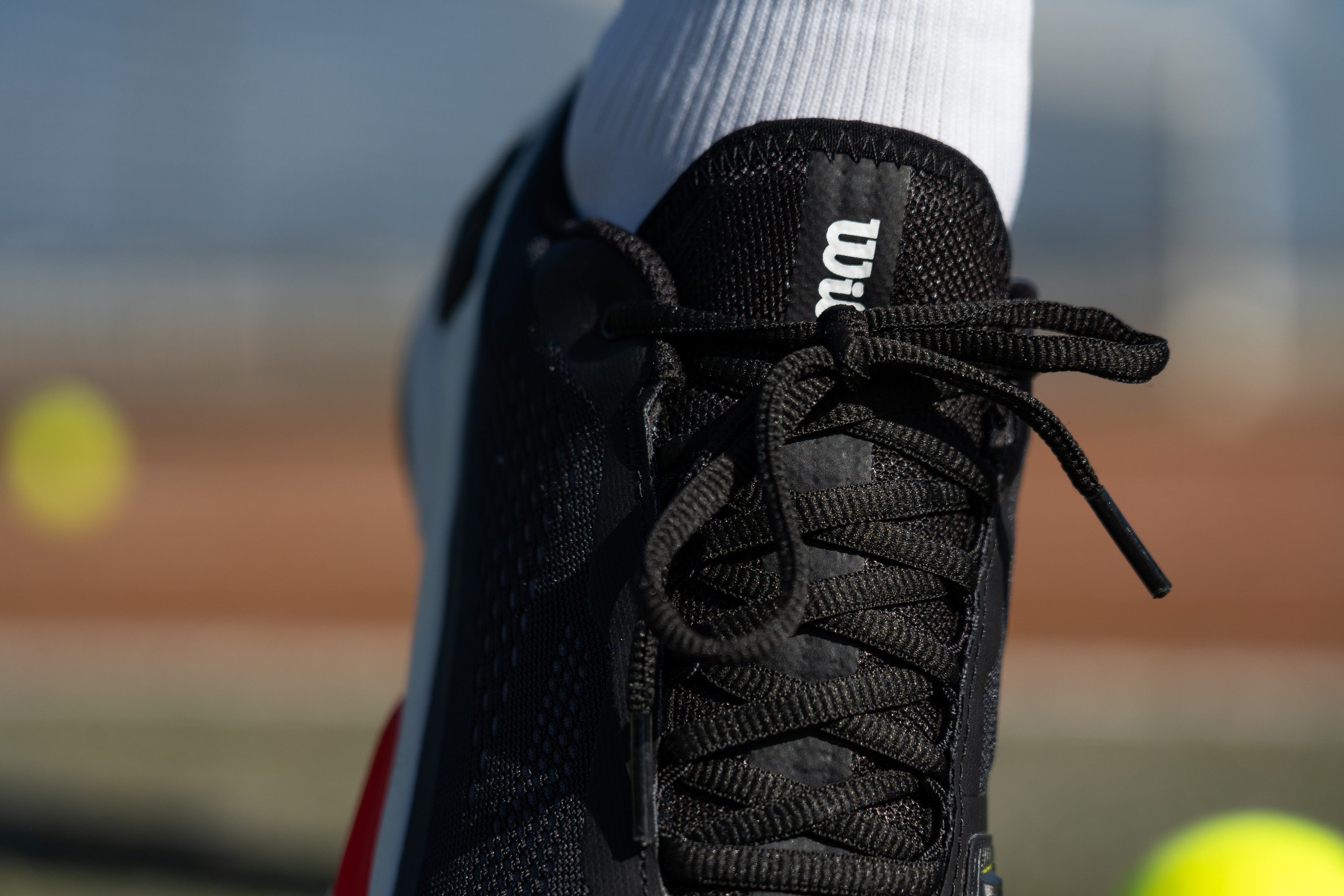
This will result in more pressure around the midfoot and quicker deterioration of the eyelets and laces.
Flexibility / Stiffness
Even though the Rush Pro 4.0 comes with a stiff shank in the midfoot, it doesn't seem to affect its flexibility at all!
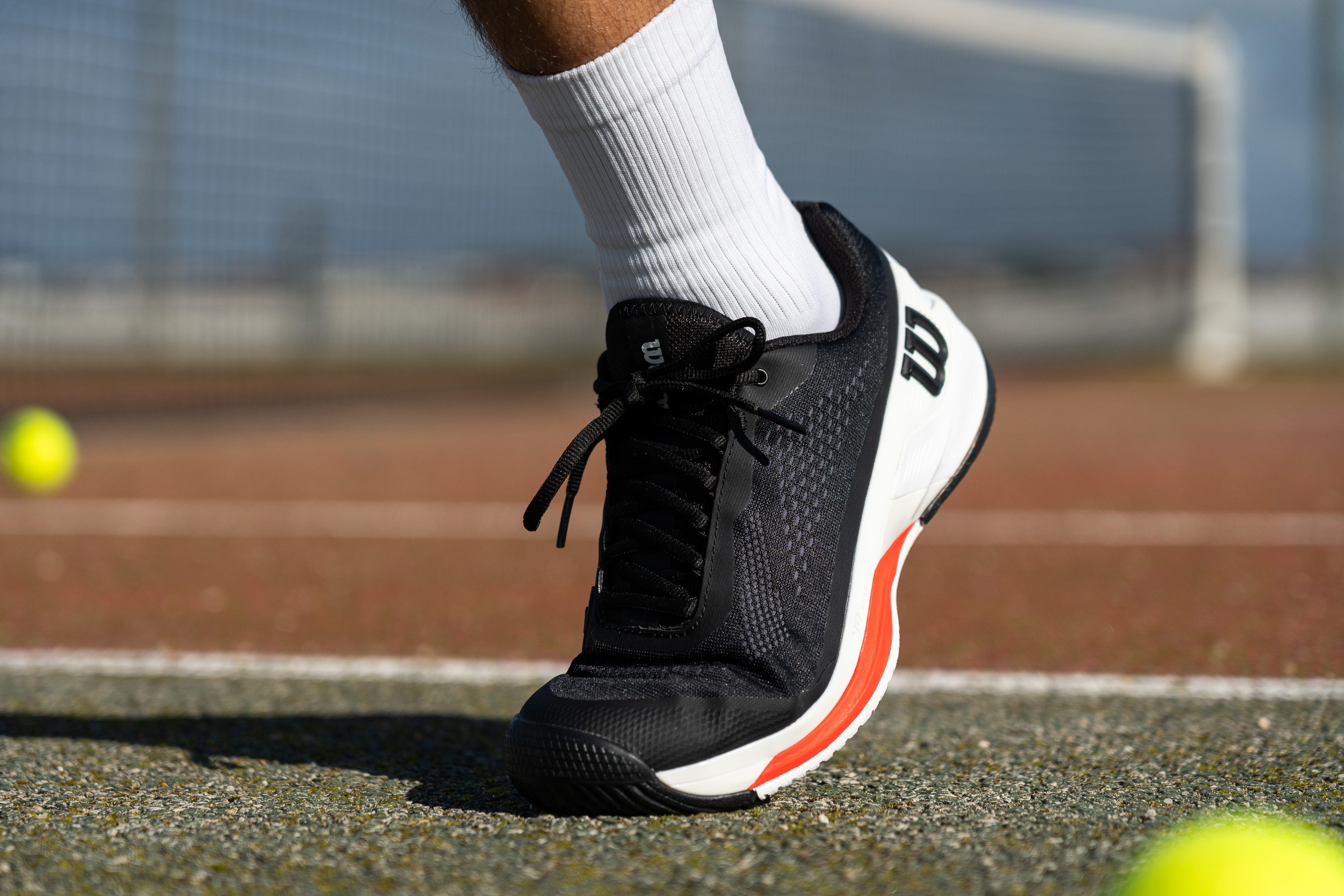
We were able to bend our feet most naturally in this Wilson tennis shoe. Perhaps this is also thanks to its softer midsole foam? Anyway, this is what makes this tennis shoe feel so different from the rest of the market.
To measure exactly how pliable the Rush Pro 4.0 is, we used a force gauge to bend the shoe to a 90-degree angle.
The tool showed that this Wilson shoe requires as little as 23.9N to do that! This is 30% more flexible than the average tennis shoe.
This test follows an older methodology, which is why you don't see recently tested shoes in the chart. Results from different methodologies can not be compared.
| Rush Pro 4.0 | 23.9N |
| Average | 30.7N |
Weight
Playtesting the Rush Pro 4.0, we couldn't put our finger on its weight category. It is not really a heavy shoe but not a light one either.
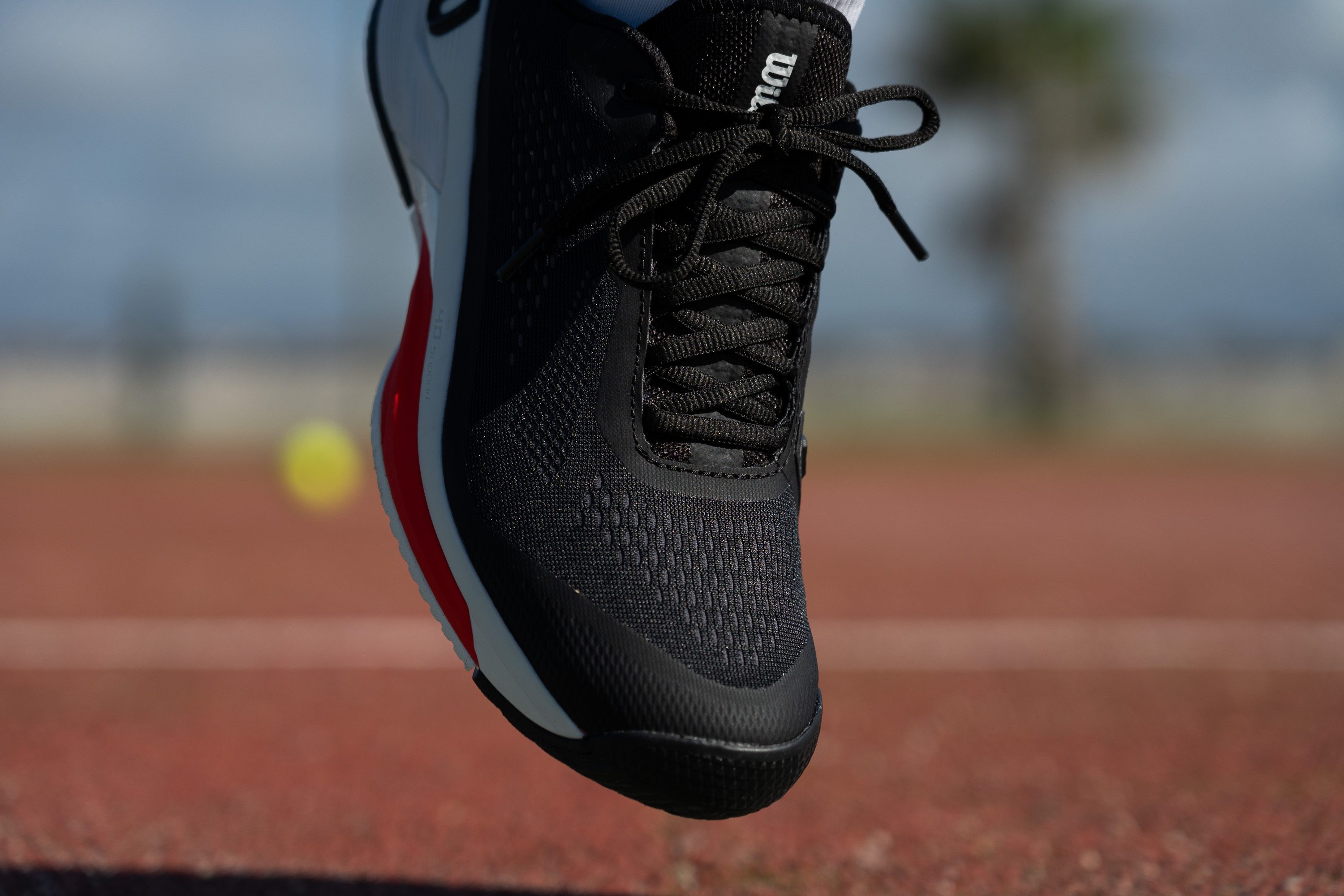
Weighing the Wilson Rush Pro 4.0 in a men's US size 9, our scale showed 13.0 oz (367g). This is right in the middle of tennis shoes but on foot, the shoe feels quite light.
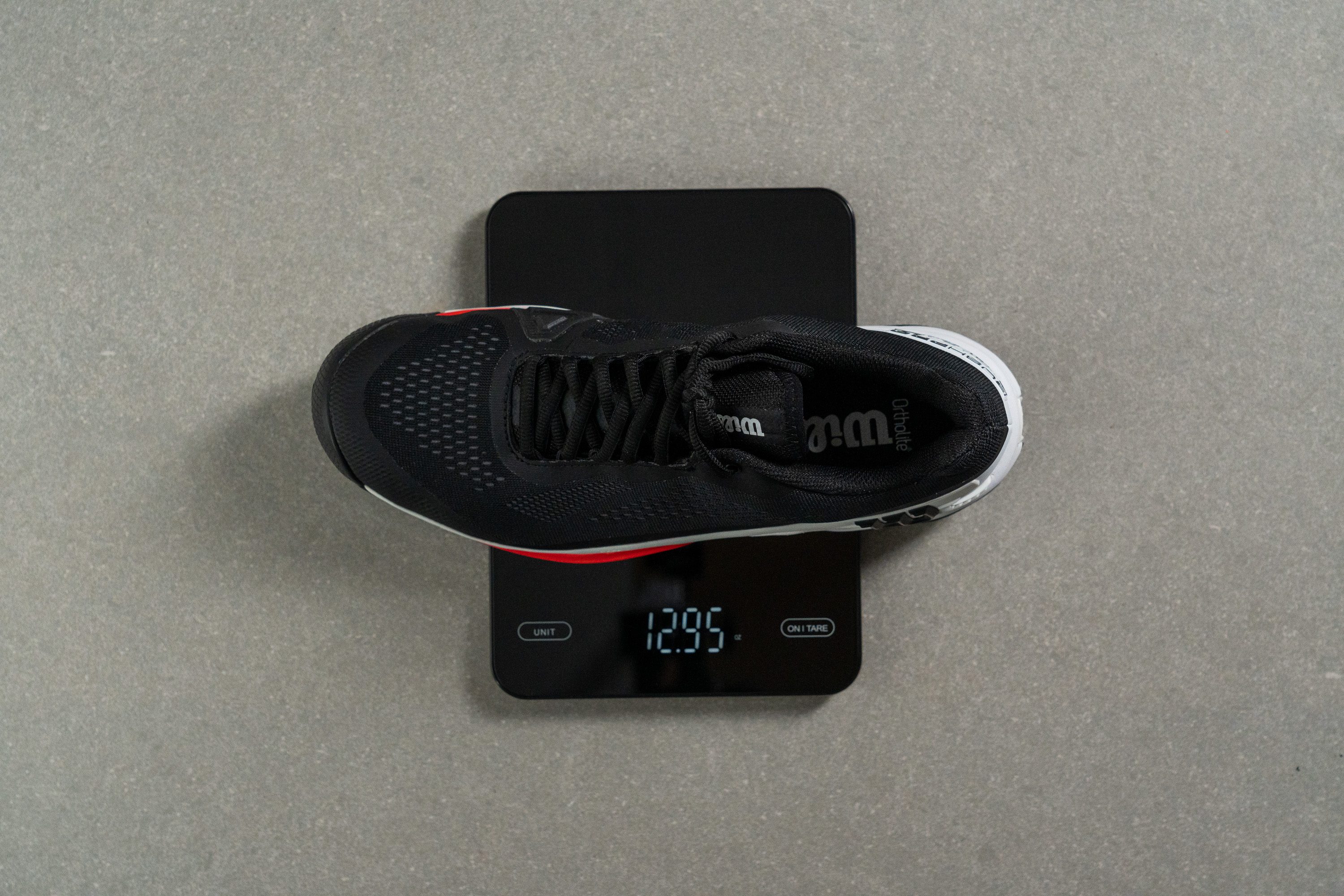
| Rush Pro 4.0 | 12.9 oz (367g) |
| Average | 12.8 oz (363g) |
Breathability
This shoe from Wilson is impossibly stuffy! We think that everyone who plays tennis in warm weather should avoid the Rush Pro 4.0.
What the brand calls "minimally layered upper" couldn't be further from the truth.
We always double-check our own experience in the lab to stay as objective as possible. But even in our smoke-pumping machine test, the shoe's upper refused to let the smoke out! As you can see from the video, there is just a tiny streak coming out of the eyelet area.
Even when it's put against the light, this material fails to show any ventilation holes.

We went further by investigating the fabric through our microscope. But it only confirmed our previous findings - it is a hella warm shoe.
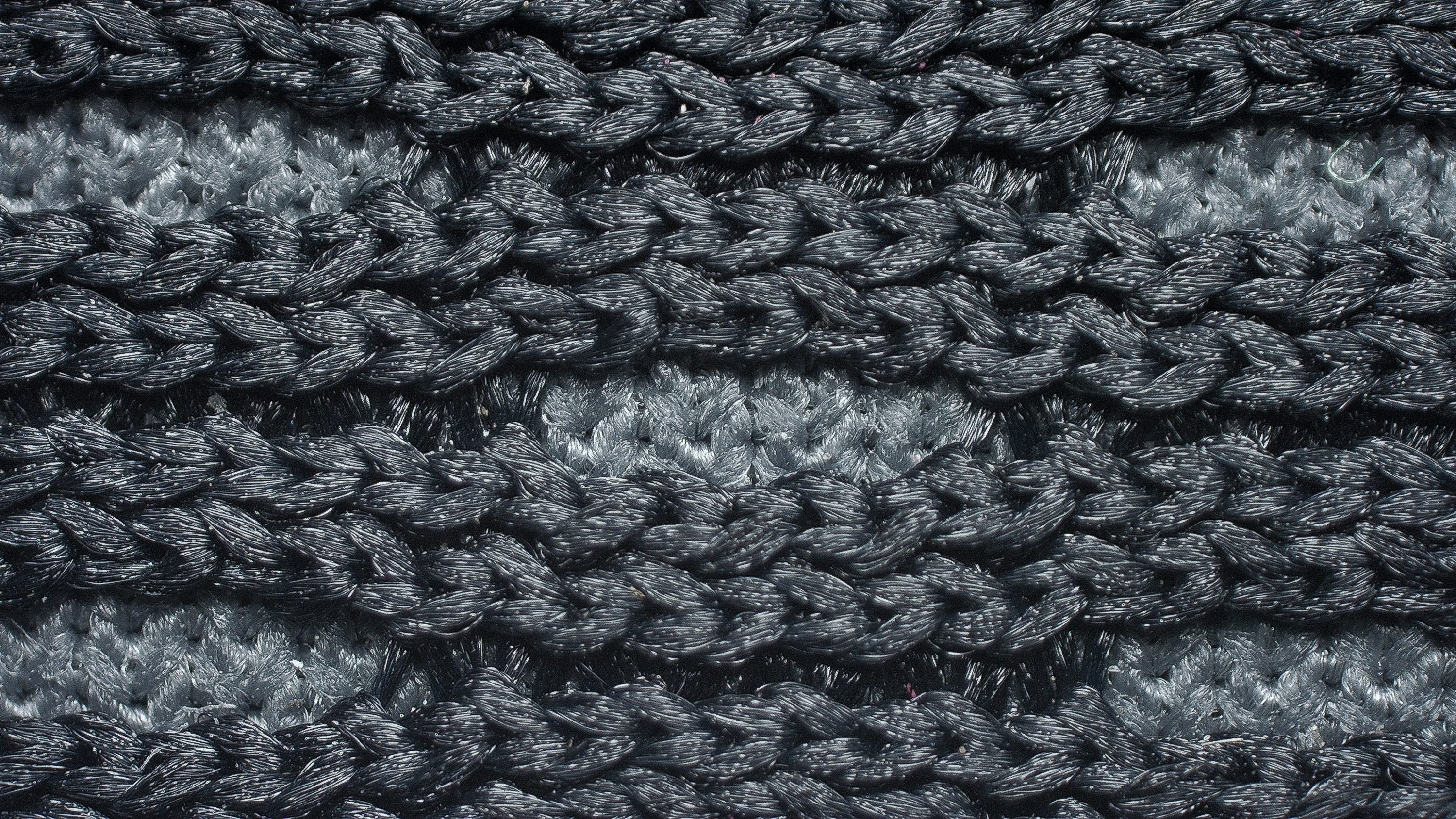
On a 1-5 scale, where 5 is the most breathable, we gave the Wilson Rush Pro 4.0 the lowest score of 1.
| Rush Pro 4.0 | 1 |
| Average | 3.1 |
Stability
Lateral stability test
The Wilson Rush Pro 4.0 looks like it's been meticulously engineered and packed with technologies and stabilising features.
And on foot... it feels exactly like that.
This tennis shoe has a good amount of stability to prevent ankle rolls very well. But we must warn you that it doesn't feel as secure as the flagship stability shoes out there - the ASICS Gel Resolution 9 or the Adidas Barricade 13.
Torsional rigidity
The mainstay of the shoe's stability is the 4D Support Chassis 2.0 which comprises two parts:
- one piece is placed on the sides for lateral stability
- the other runs underfoot for added propulsion on take-offs (think of a springboard at the pool)
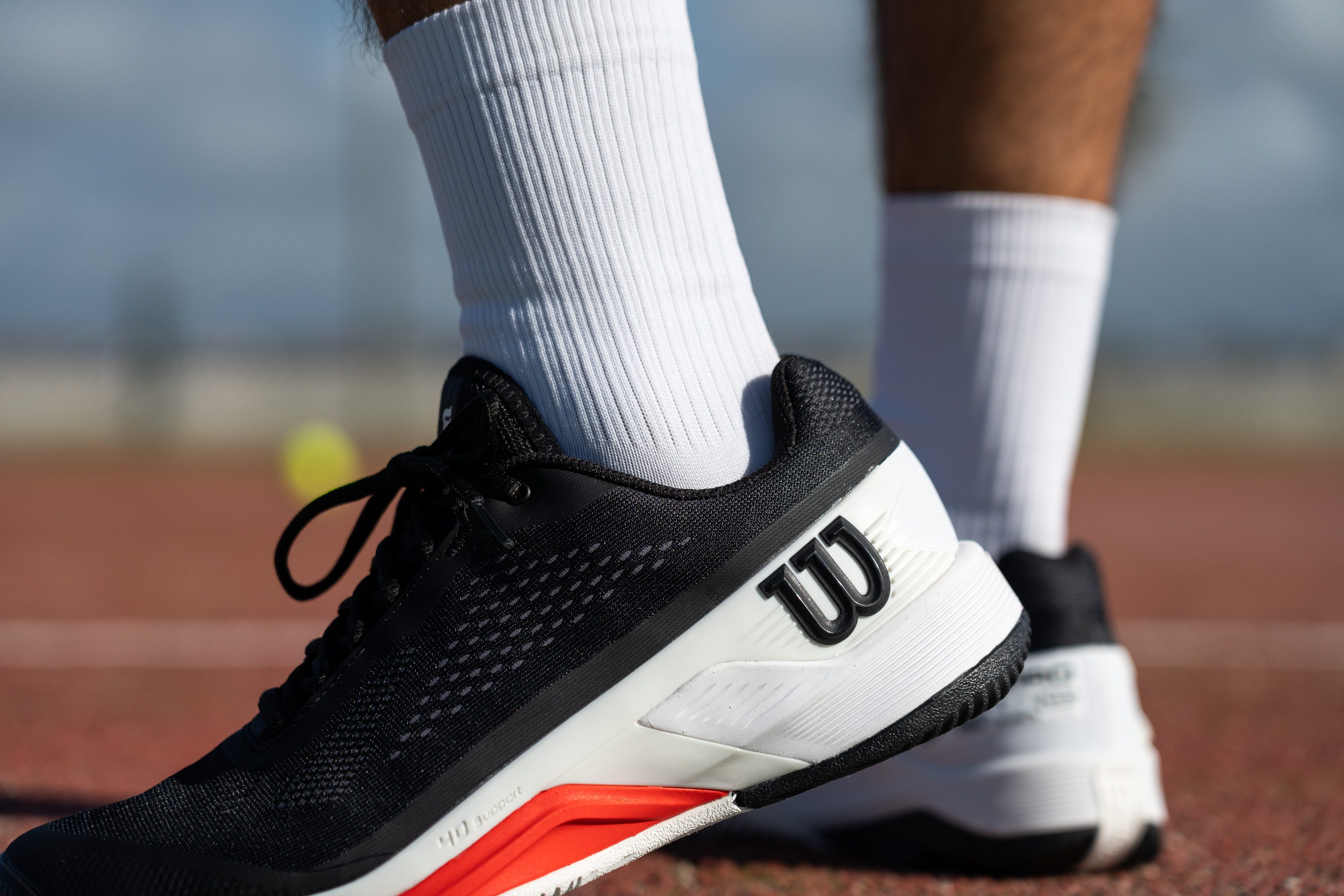
Together these pieces add plenty of torsional rigidity to the Rush Pro 4.0. Stiffness makes this tennis shoe immune to awkward foot and ankle rolls on forceful multi-directional movements.
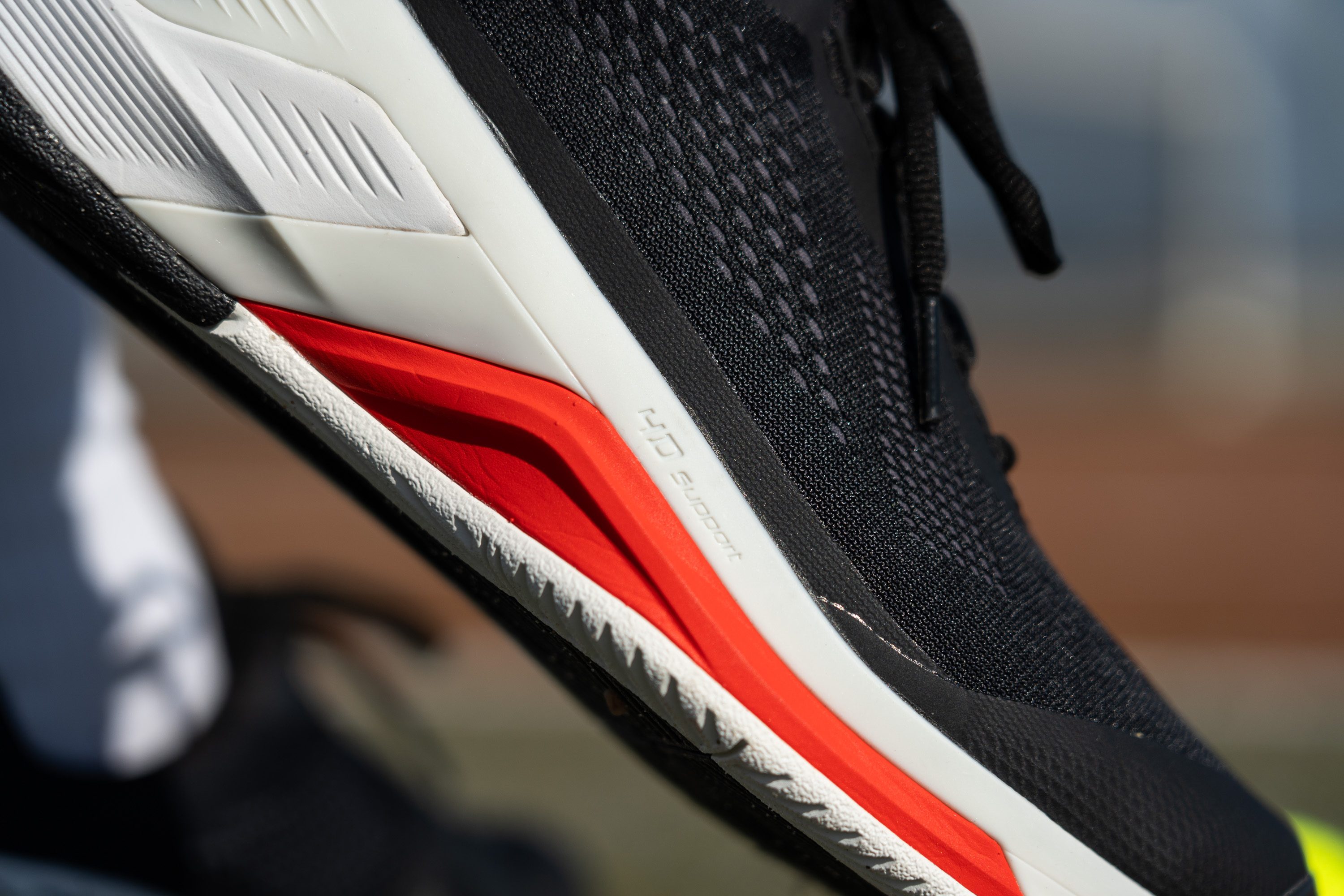
In our manual test, we rated the shoe's torsional rigidity with the highest score of 5.
| Rush Pro 4.0 | 4 |
| Average | 4.4 |
Heel counter stiffness
As part of the shoe's stabilising chassis, the Rush Pro 4.0 features a substantial heel counter.
We rated its stiffness with the highest possible score of 5 in our manual push-squeeze test. There is absolutely no give to the back of the shoe which kept our heels securely in place even during the most intense footwork.
| Rush Pro 4.0 | 5 |
| Average | 4.1 |
Midsole width - forefoot
However, the platform of the Wilson Rush Pro 4.0 doesn't seem to be very wide. In fact, it is a bit narrower than average.
Measuring the widest part of the shoe's midsole in the forefoot, our calliper showed 110.1 mm. This is just enough width to create an outrigger which helps to stay steady and bounce back from lateral cuts.
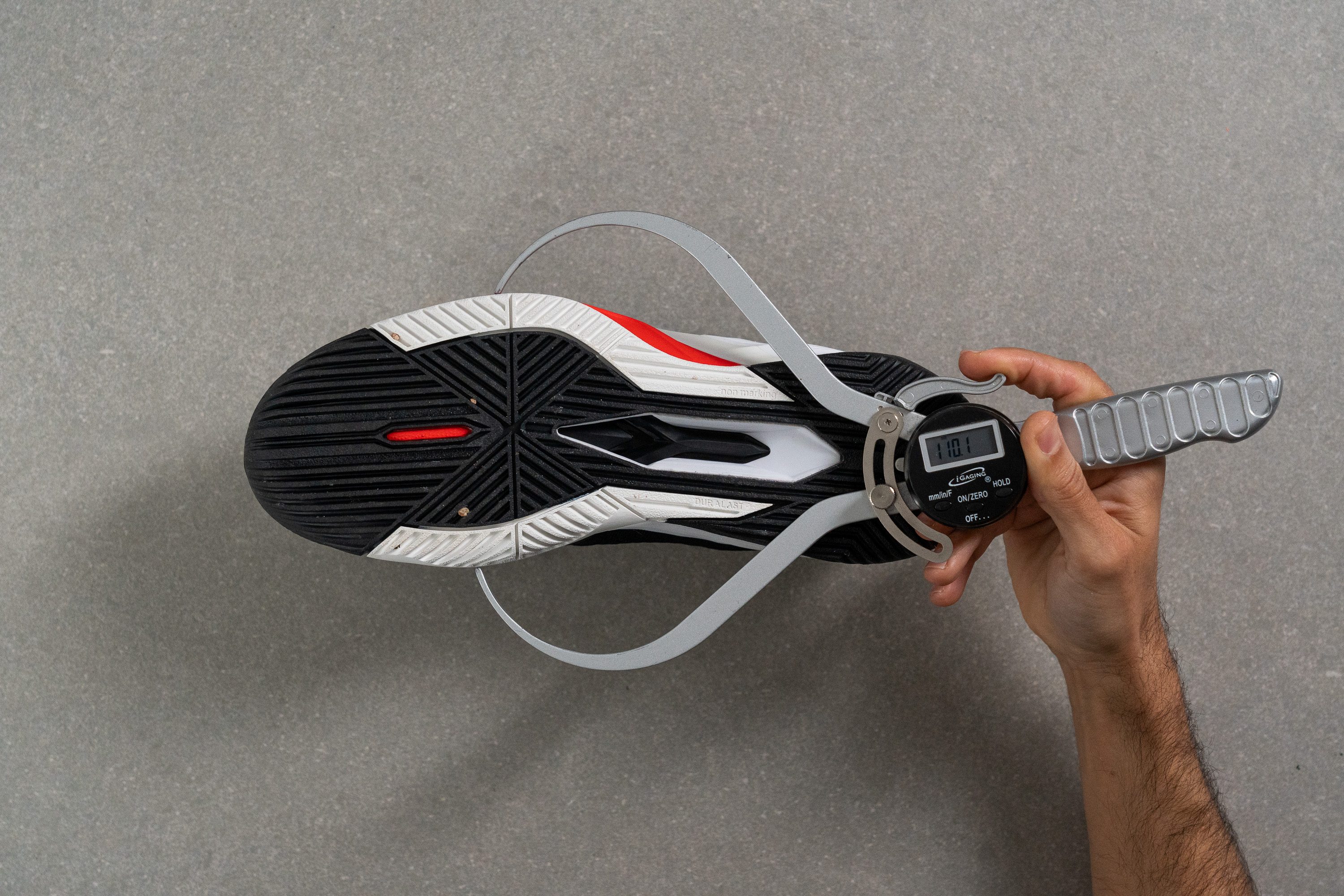
| Rush Pro 4.0 | 110.1 mm |
| Average | 112.0 mm |
Midsole width - heel
In the widest part of the shoe's heel, our calliper showed 86.7 mm. Again, a couple of millimetres narrower than average but just enough to keep our feet stable.
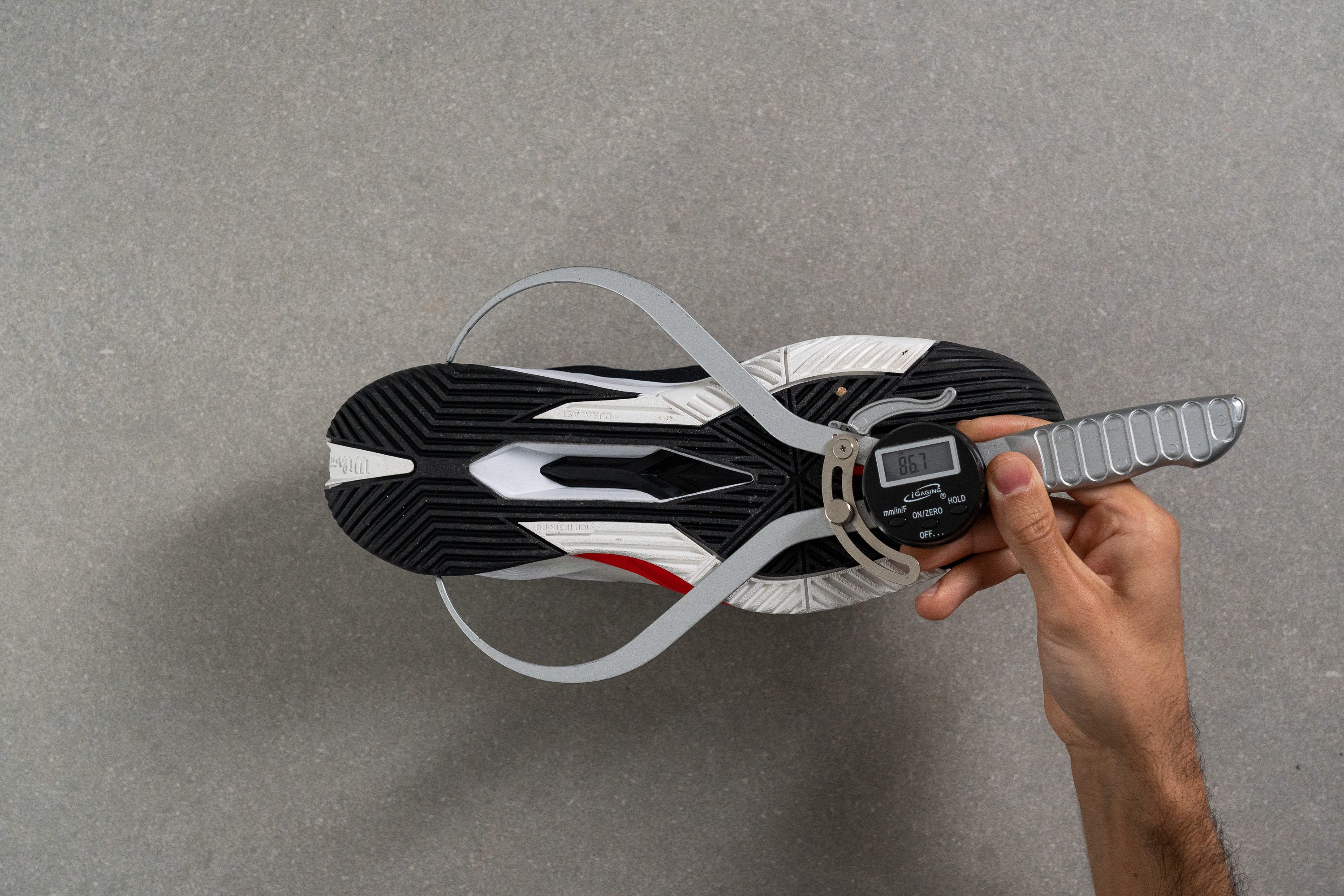
| Rush Pro 4.0 | 86.7 mm |
| Average | 89.6 mm |
Durability
Toebox durability
On the bright side, the lack of breathability is very well compensated for by the shoe's impressively durable upper.
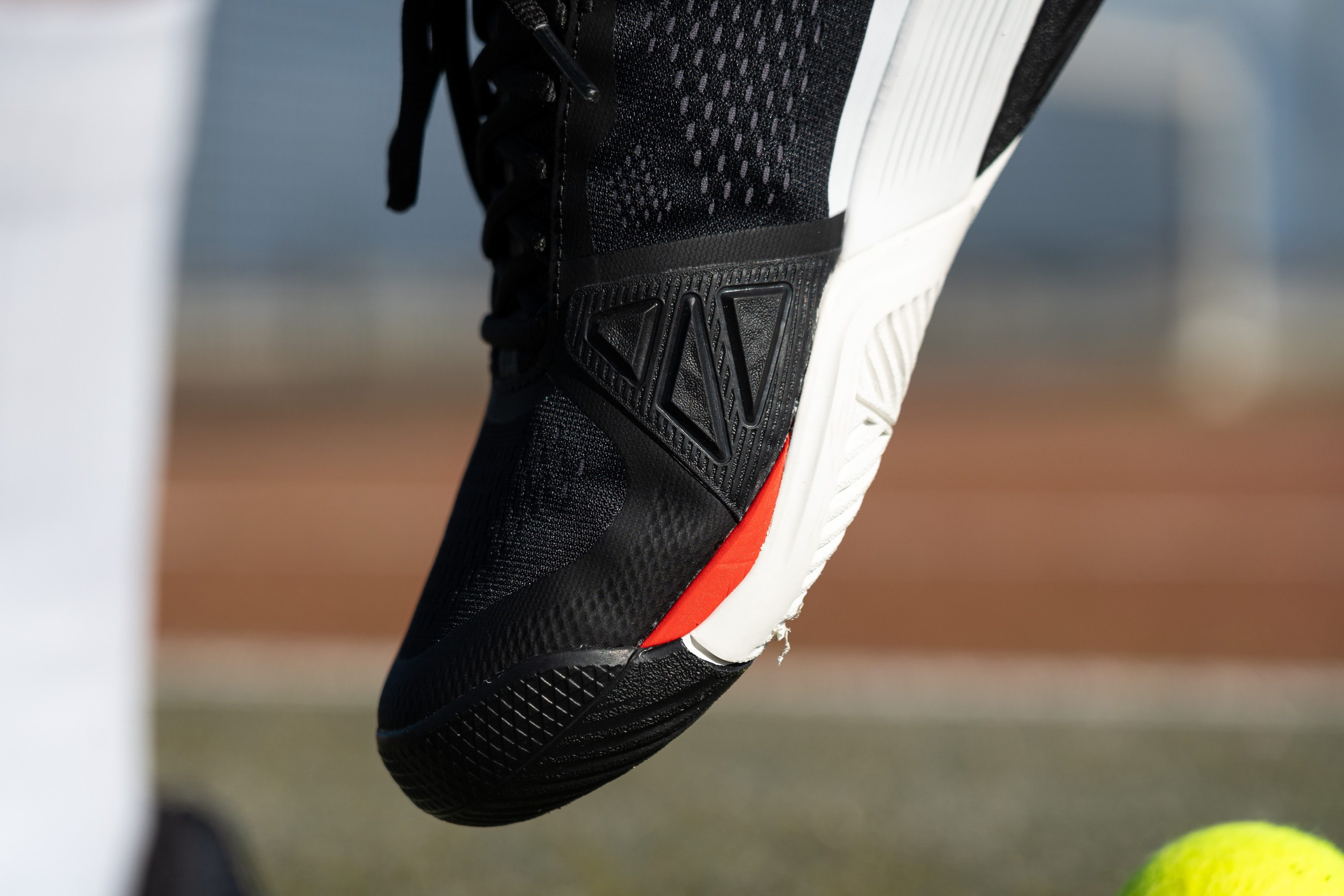
The Rush Pro 4.0 has a substantial toe drag guard on the medial side as well as an enlarged toe bumper and rubberized overlays on the high-wear areas. But apart from that, the shoe's mesh is incredibly wear-resistant by itself!
To test its durability, we applied a Dremel with a sandpaper tip to the fabric for 12 seconds. The speed (5K RPM) and pressure (3.2N) remained consistent for comparable results.
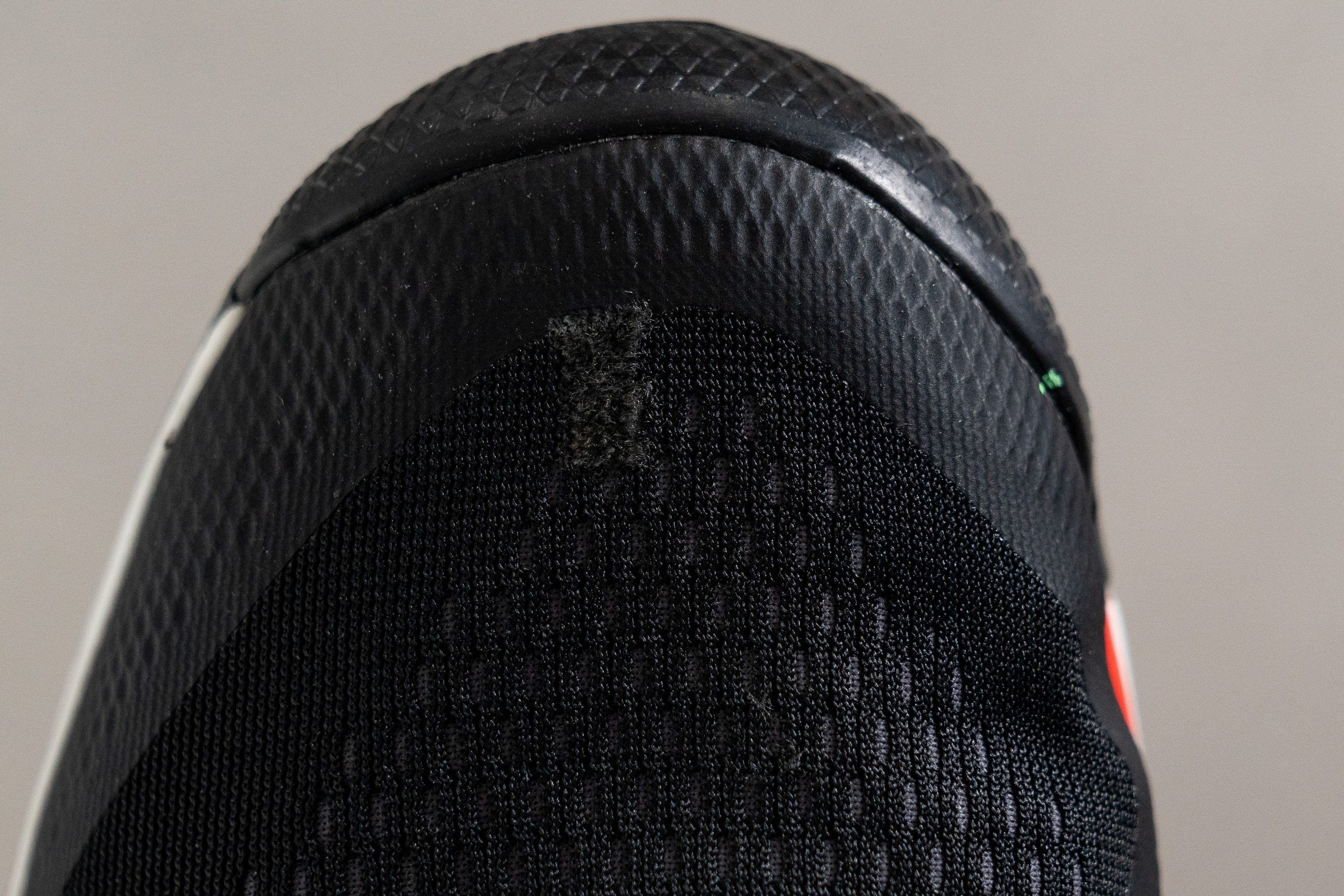
As you can see, the tool didn't even get through the topmost layer of the mesh! This further convinced us that the Wilson Rush Pro 4.0 can be recommended to aggressive toe draggers out there.
On a 1-5 durability scale, we can readily give the shoe the highest score of 5!
| Rush Pro 4.0 | 5 |
| Average | 3.7 |
Heel padding durability
Another sensitive area of every tennis shoe is the interior heel padding. Non-stop multi-directional movements of the game create a lot of friction in this part of the shoe, causing it to tear before any other part.
Of course, we are back here with a Dremel to test that out.
We applied the tool's tip to the fabric for only 4 seconds (because the material is THAT delicate) at the speed of 5K RPM.
As the photo below shows, the Rush Pro 4.0 didn't do so well here. Looking at the large tear in the lining, we had to rate the shoe's heel padding durability with the lowest score of 1.
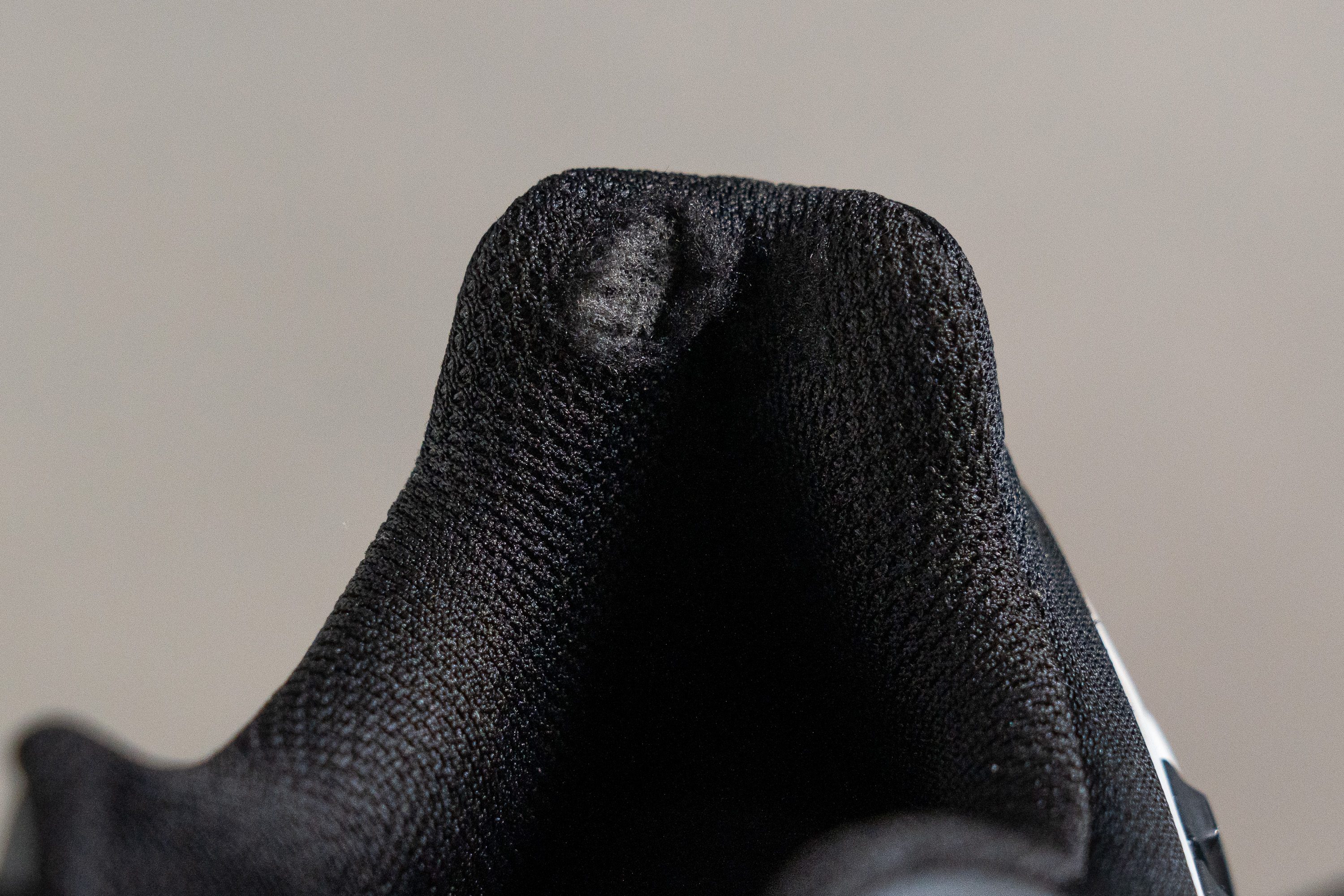
| Rush Pro 4.0 | 1 |
| Average | 3.3 |
Outsole hardness
Even though the Wilson Rush Pro 4.0 is a moderately-priced tennis shoe, it doesn't skimp on the outsole rubber.
The first thing we noticed was how hard its Duralast rubber compound was. Based on our durometer measurement, its hardness comes in at 87 HC which is on par with the more expensive models.
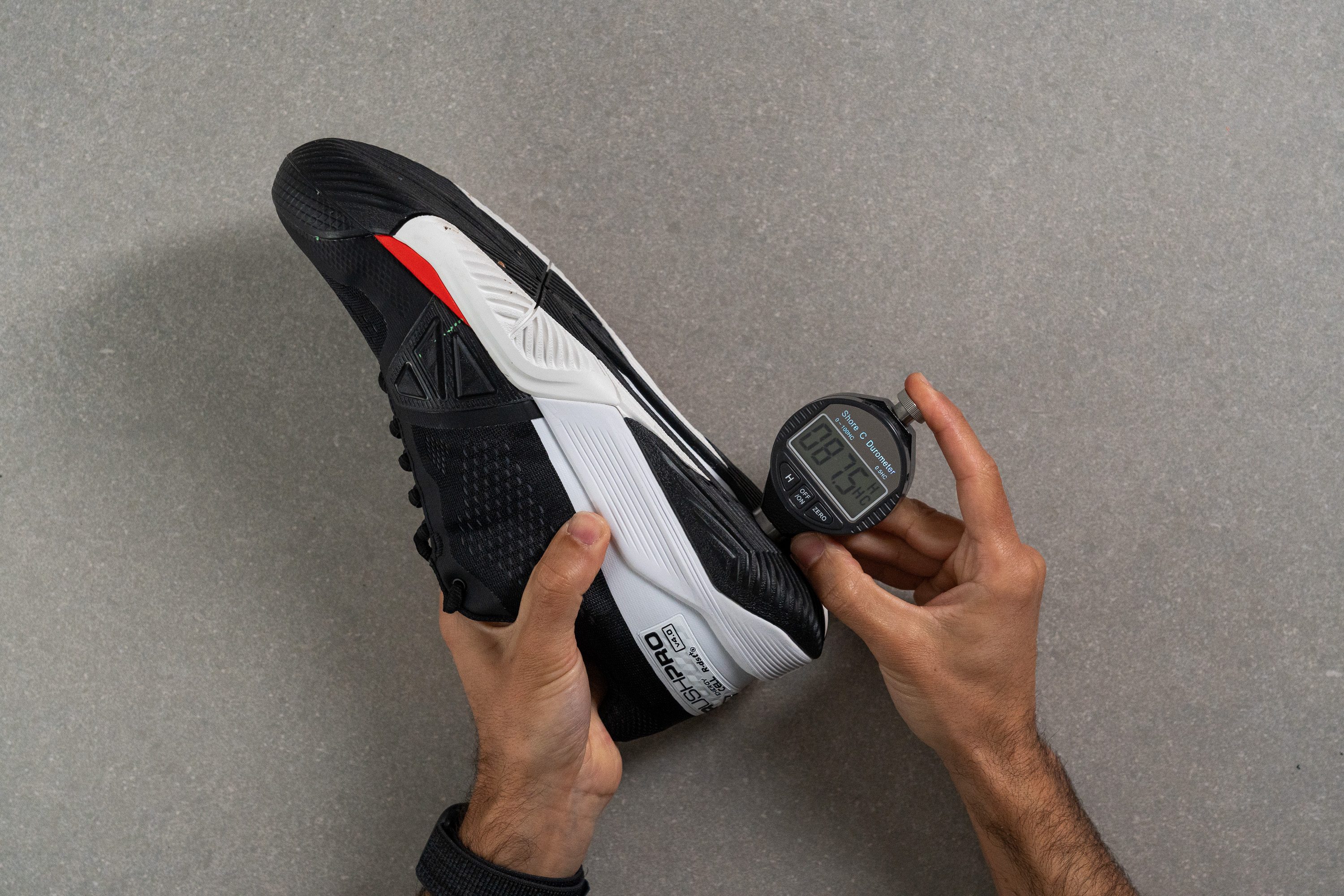
| Rush Pro 4.0 | 87.0 HC |
| Average | 86.0 HC |
Outsole durability
But the only test that can convince us of a shoe's outsole durability is of course the Dremel test.
For the outsole, we set the Dremel speed higher (10K RPM) and hold it against the rubber for longer (22 seconds).
We were truly impressed that the Rush Pro's outsole only wore off by 0.72 mm! This is shallower than we expected and is a promising sign of long-term durability.
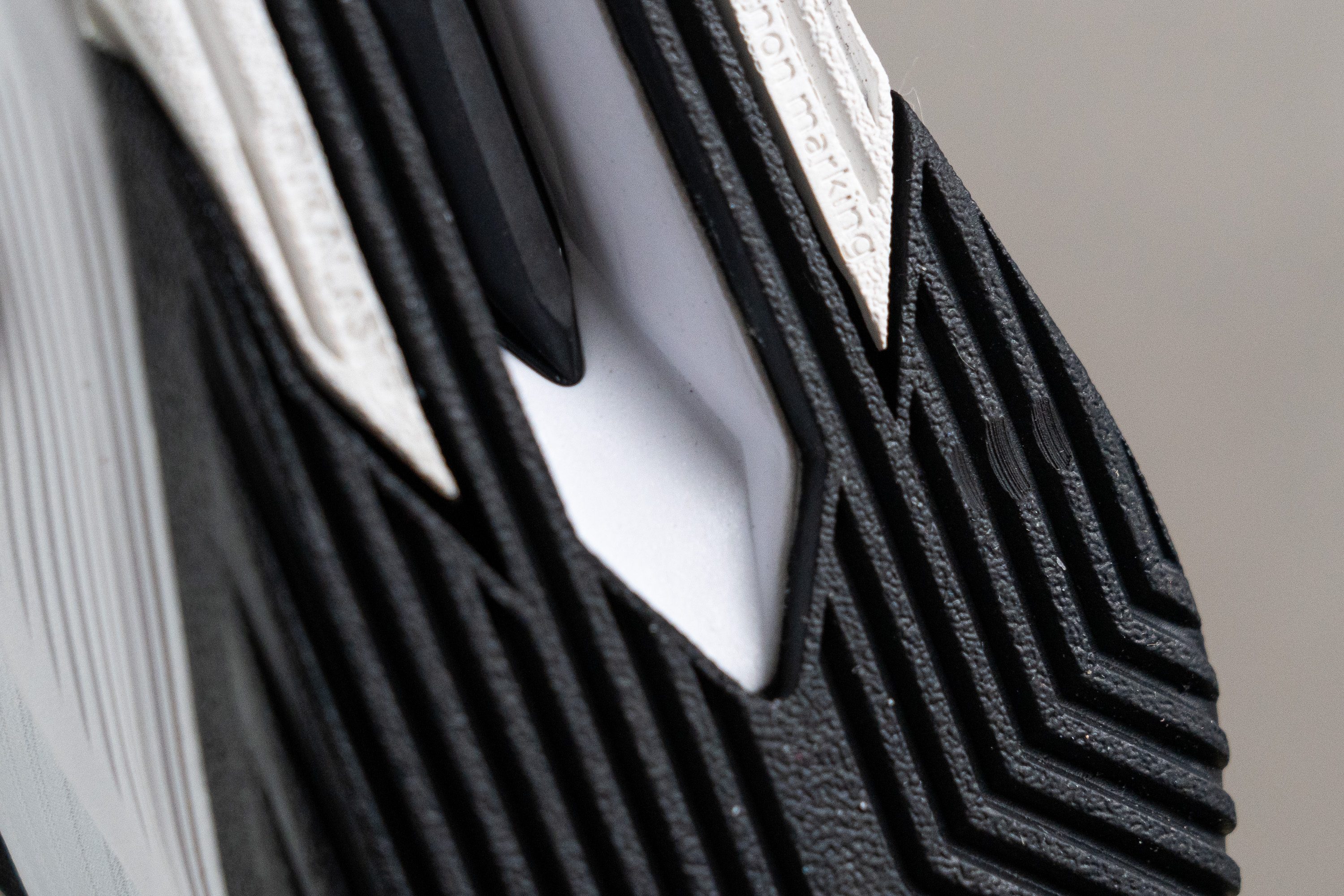
| Rush Pro 4.0 | 0.7 mm |
| Average | 0.8 mm |
Outsole thickness
We also measured the shoe's outsole thickness at 4.1 mm which is the same as the average of tennis shoes.
For added reassurance, Wilson also offers a 6-month outsole guarantee for the Rush Pro 4.0. That means you can get a replacement in case the outsole on your pair blows sooner than 6 months.
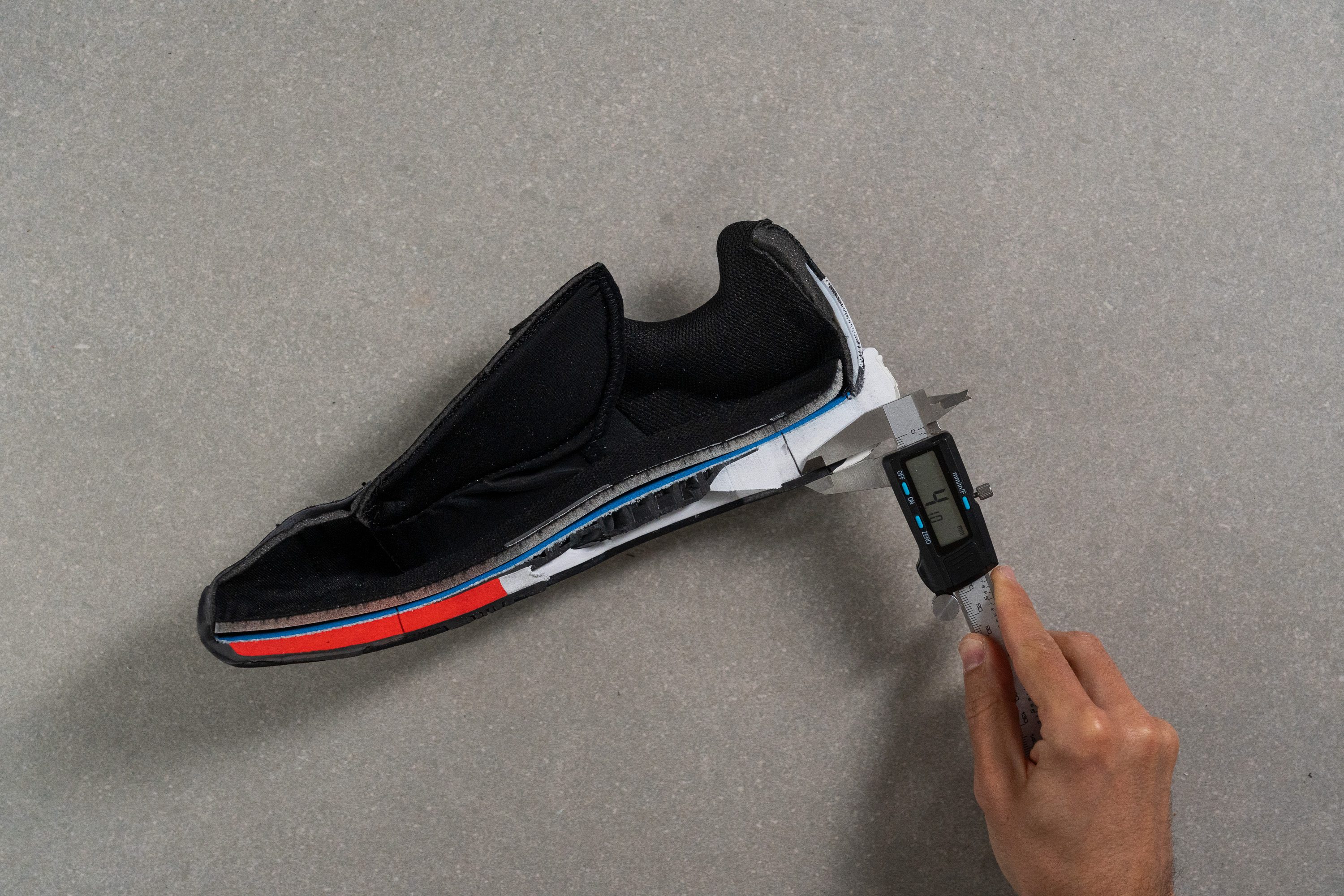
| Rush Pro 4.0 | 4.1 mm |
| Average | 4.2 mm |
Misc
Insole thickness
The cushioning of the Rush Pro 4.0 is elevated by the well-padded OrthoLite insole. It is a bit thinner than average at 4.1 mm but its moulded shape feels beautifully ergonomic underfoot.
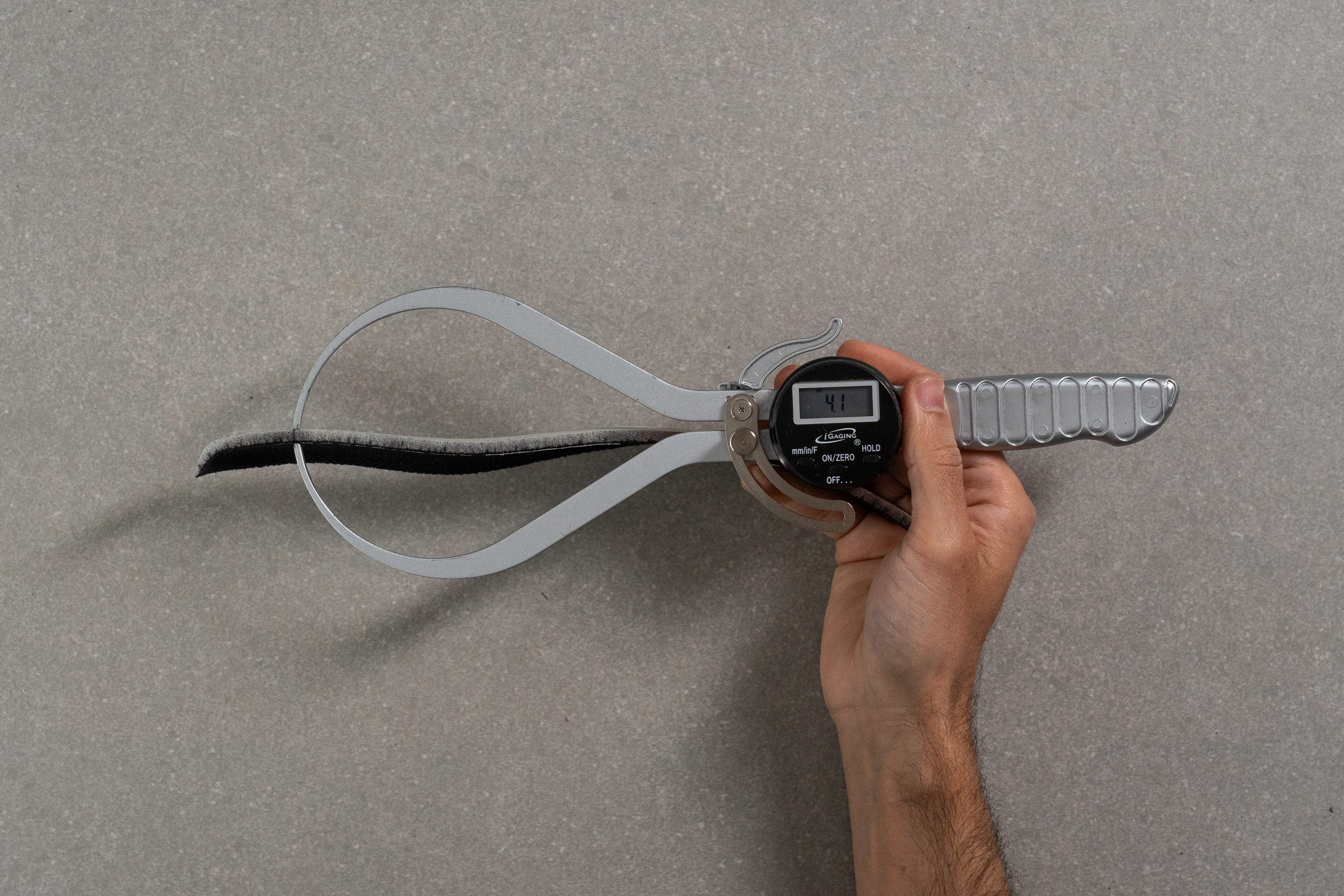
| Rush Pro 4.0 | 4.1 mm |
| Average | 5.1 mm |
Removable insole
You have the option to swap the shoe's stock insole with your own custom orthotics. But we don't see the need to do so given the high quality of this molded OrthoLite insert.
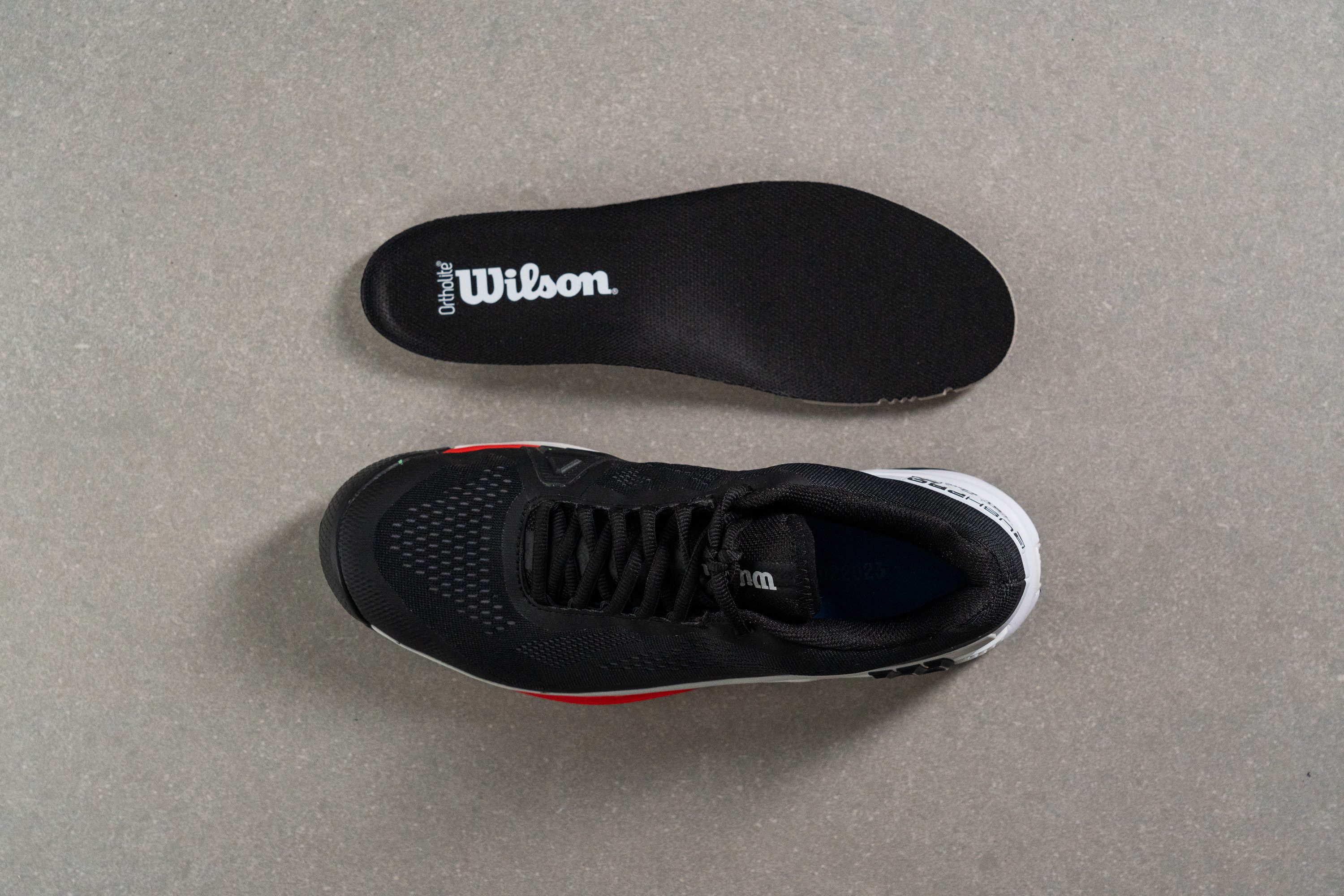
| Rush Pro 4.0 | Yes |
Tongue padding
But if you need to cinch up the laces real tight, you would want a well-padded tongue, right?
Unfortunately, the Rush Pro 4.0 doesn't have much to offer. Measuring the shoe's tongue thickness at 5.7 mm, we found it to be thinner than average.
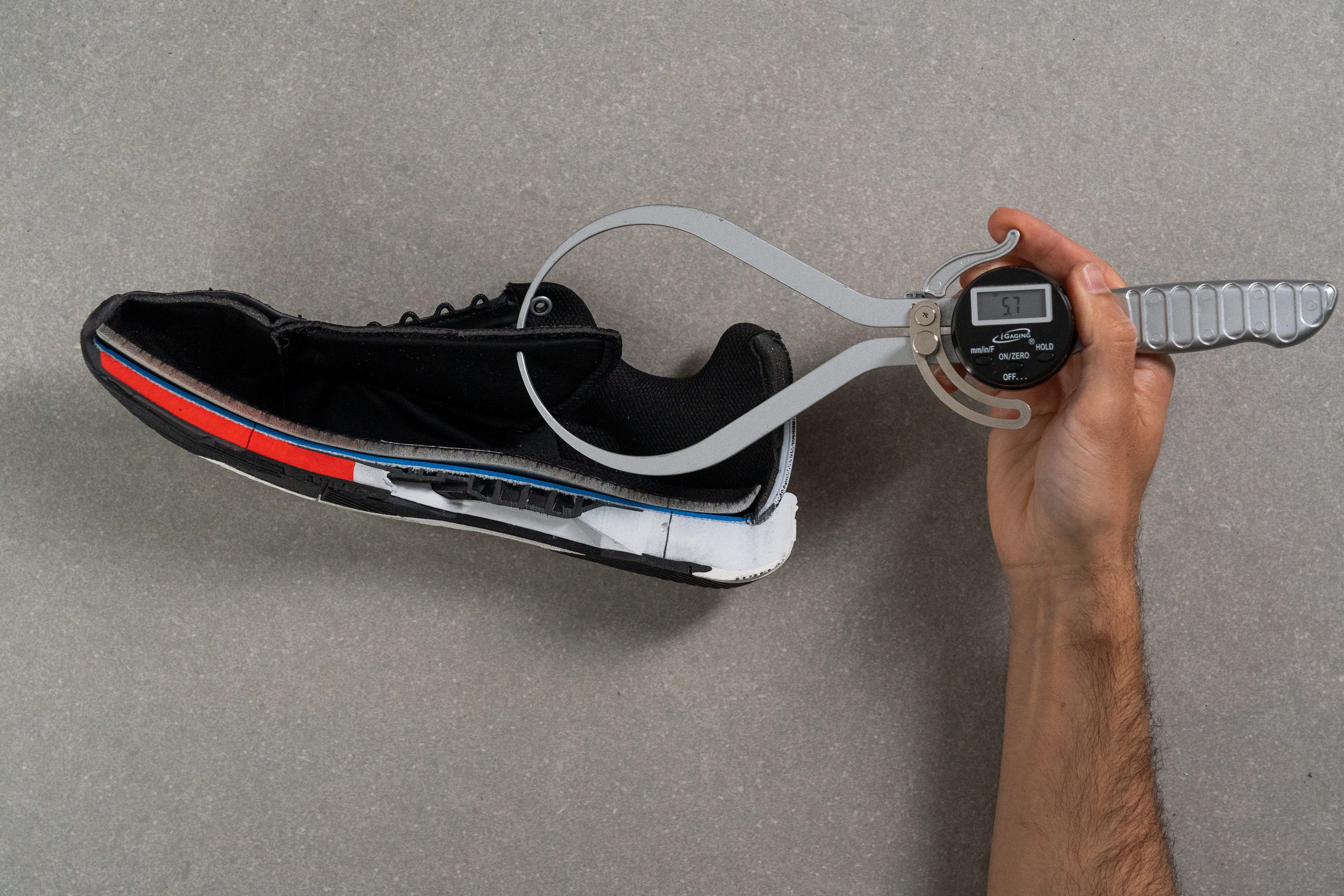
| Rush Pro 4.0 | 5.7 mm |
| Average | 8.3 mm |
Tongue: gusset type
We were happy to discover that the Rush Pro 4.0 comes with a fully gusseted tongue. The brand itself calls it Endofit, or a full inner sock.
This setup really contributed to the lockdown as the shoe's lacing system turned out to be somewhat lacklustre.
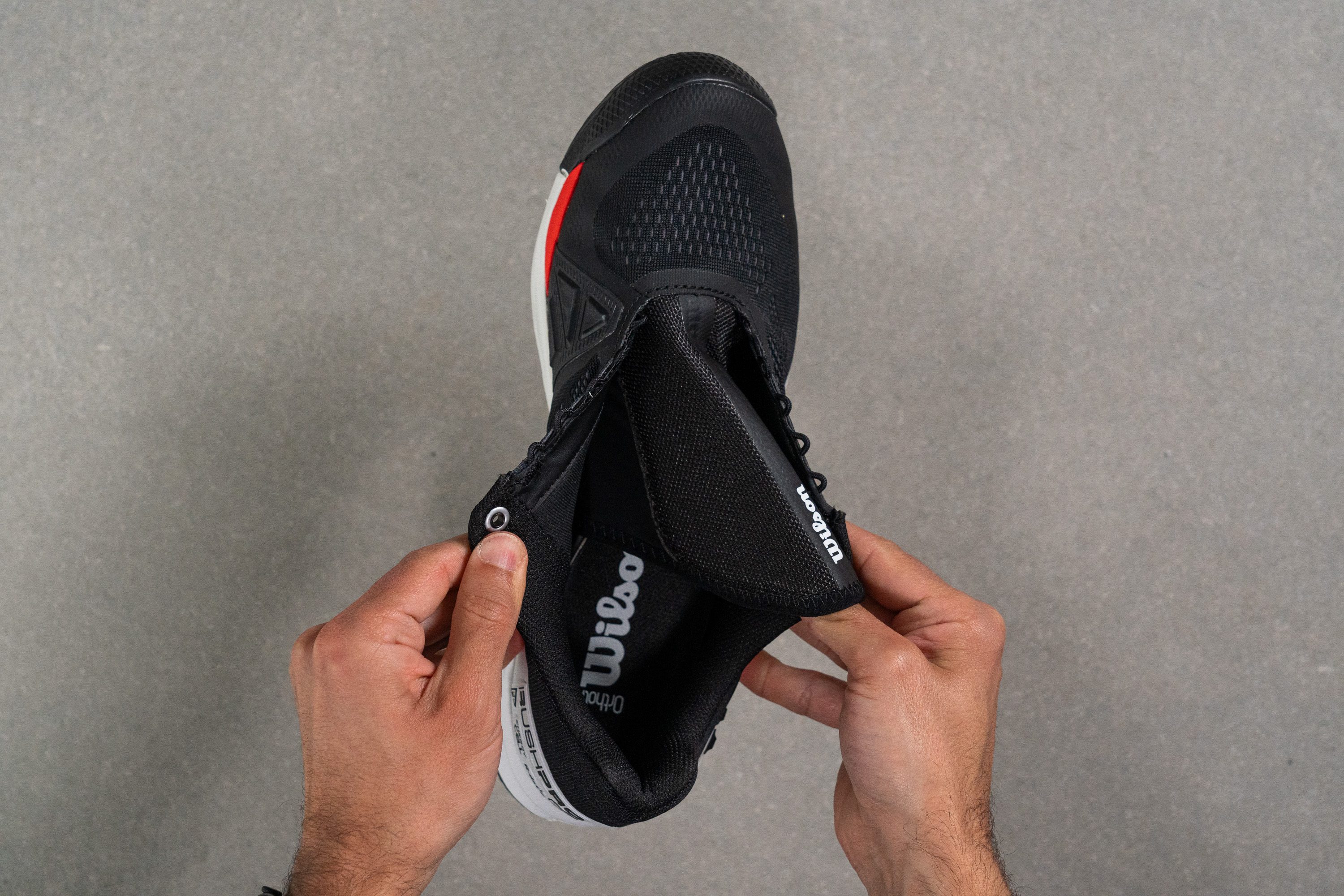
| Rush Pro 4.0 | Both sides (full) |
Heel tab
In the absence of a pull tab, you will need both hands to get your foot inside the Wilson Rush Pro's inner sleeve. And if you don't want to ruin the shoe's heel padding too soon (it is quite fragile in this shoe), we recommend using a shoehorn.
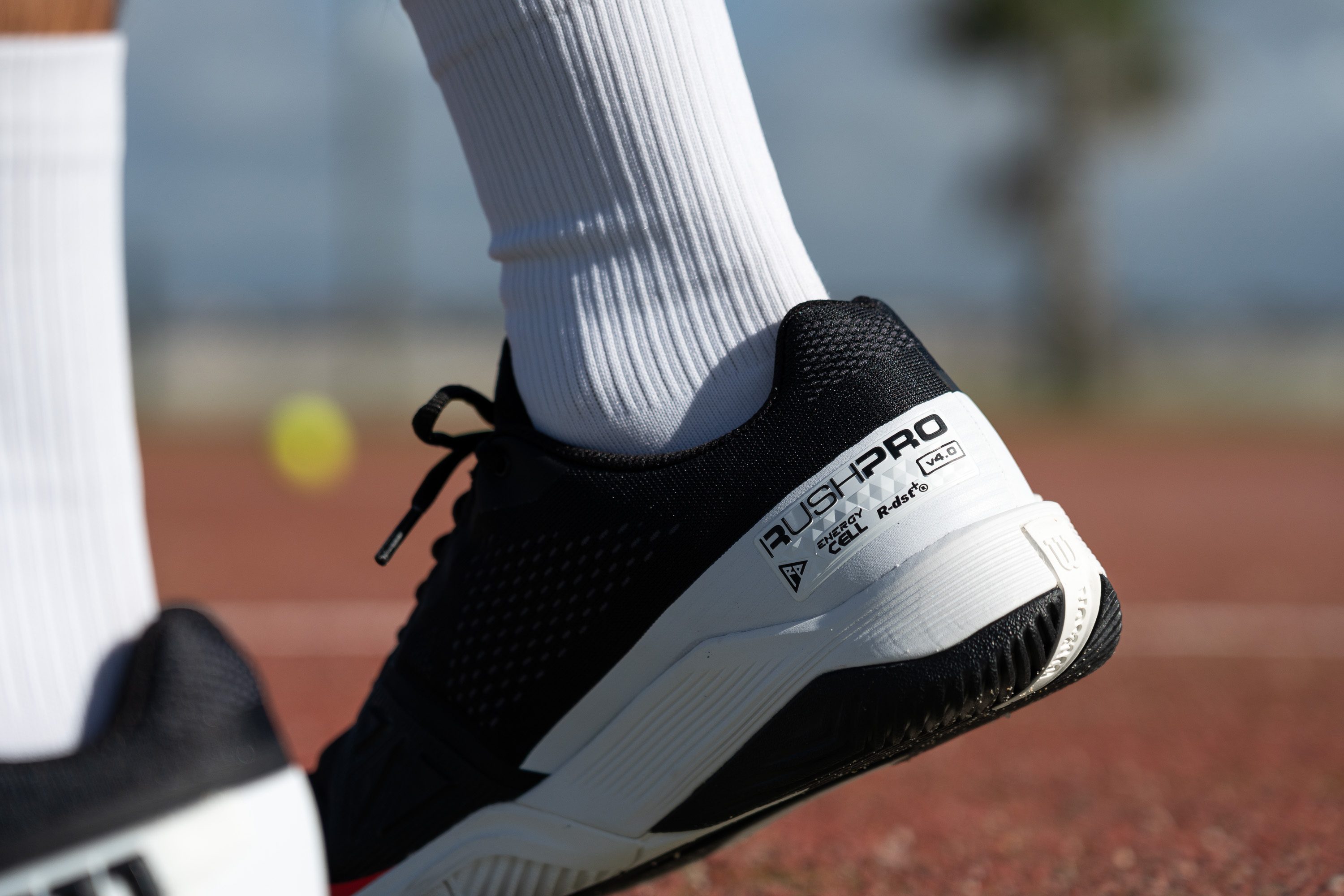
| Rush Pro 4.0 | None |

